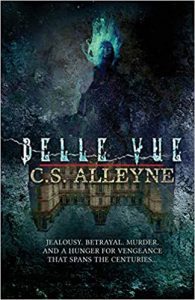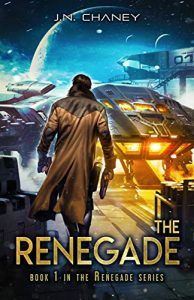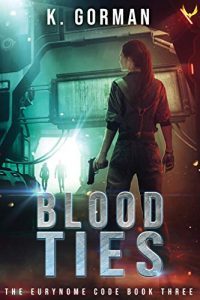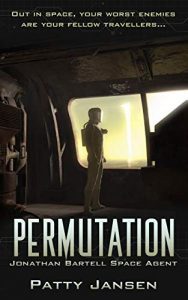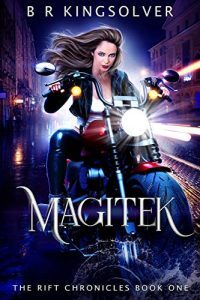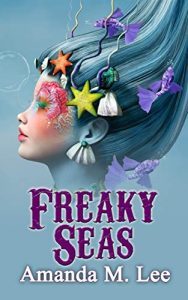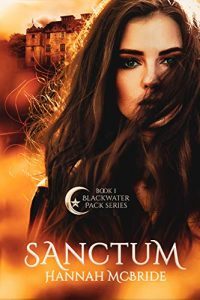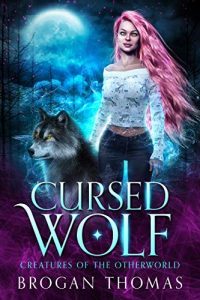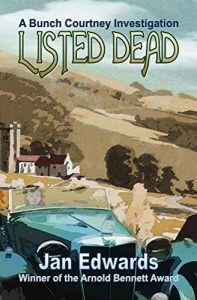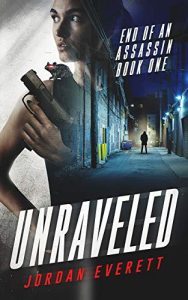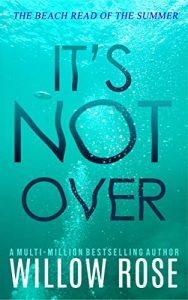Cora Buhlert's Blog, page 54
August 30, 2020
Indie Speculative Fiction of the Month for August 2020

It’s that time of the month again, time for “Indie Speculative Fiction of the Month”.
So what is “Indie Speculative Fiction of the Month”? It’s a round-up of speculative fiction by indie authors newly published this month, though some July books I missed the last time around snuck in as well. The books are arranged in alphabetical order by author. So far, most links only go to Amazon.com, though I may add other retailers for future editions.
Once again, we have new releases covering the whole broad spectrum of speculative fiction. This month, we have urban fantasy, epic fantasy, science fantasy, paranormal mysteries, paranormal romance, space opera, military science fiction, dystopian noir, horror, vampires, werewolves, ghosts, zombies, ghouls, dragons, demon hunters, space mages, cyborgs, space marines, intergalactic outlaws, haunted asylums, haunted space stations, crime-busting witches and much more.
Don’t forget that Indie Speculative Fiction of the Month is also crossposted to the Speculative Fiction Showcase, a group blog run by Jessica Rydill and myself, which features new release spotlights, guest posts, interviews and link round-ups regarding all things speculative fiction several times per week.
As always, I know the authors at least vaguely, but I haven’t read all of the books, so Caveat emptor.
And now on to the books without further ado:
Jealousy. Betrayal. Murder. And a hunger for vengeance that spans the centuries…
History student Alex Palmer is thrilled when his girlfriend, Claire Ryan, buys an apartment in Belle Vue Manor, formerly a Victorian lunatic asylum.
But as Alex begins to discover the dark truth about the asylum’s past, he, Claire, and their friend Marianne find themselves on a nightmarish journey. Each will face the deadly consequences of the evil that began with the construction of the first Belle Vue Manor by an aristocratic French émigré in 1789, as well as the cruelty and satanic practices that continued when it became an asylum for the insane.
As the two strands–past and present–unfold, Alex uncovers a supernatural mystery where revenge is paramount and innocence irrelevant–without being aware of the price he, and those around him, will pay.
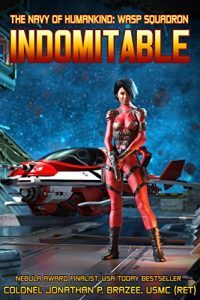 Indomitable by Jonathan P. Brazee:
Indomitable by Jonathan P. Brazee:
Beth “Fire Ant” Dalisay is the Navy’s top ace.
But the alien Crystals really don’t care. They intend on wiping out humanity no matter who stands in their way.
Pulled from her Wasp fighter, the Navy assigns Beth as a scout pilot with a mission to find the Crystal’s home world. But in an underpowered Mosquito scout and no weapons with which to defend herself, if she finds their home system, can she possibly survive long enough to report back to Navy HQ?
In a final clash between humanity and the Crystals, can one pilot make a difference? Can humanity survive?
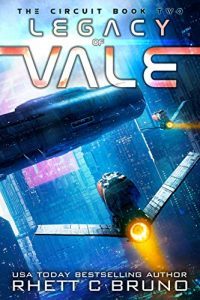 Legacy of Vale by Rhett C. Bruno:
Legacy of Vale by Rhett C. Bruno:
War threatens to destroy the Circuit once more…
After arriving on Ceres Prime, ADIM, is hesitant to help the Ceresians. Their hatred for his creator will never wane, and he starts to understand the danger all of Cassius’ many rivals pose. How can he keep him safe?
When Sage Volus finds herself a captive of Cassius Vale, she begins to struggle with her role in the coming war, and what exactly it means to be an executor. The removal of her cybernetic implant reveals emotions she thought she’d buried too deep to be found. She must make a decision on who she truly wants to serve.
After breaking free of the solar-ark Amerigo and certain death, Talon Rayne finds himself in unusual company. His quests to hold his daughter again will bring him to places he never thought he’d go?into the very arms of his people’s most hated foe.
As the battle grows ever closer, threatening the all-out war that could annihilate millions, these four must determine what part they intend to play, who they will align themselves with, and what it means to be human in a solar system where that means less and less.
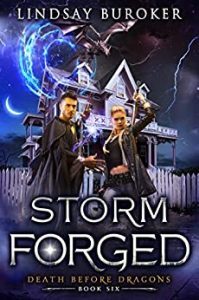 Storm Forged by Lindsay Buroker:
Storm Forged by Lindsay Buroker:
Moving into a rundown Victorian house with a vampire living in the basement isn’t as bad as I thought, but things go from weird to weirder when a badly injured gnome collapses in my back yard.
The surprising part? It’s my friend Nin’s long-lost grandfather.
Since he’s unconscious, we can’t figure out who’s chasing him, or where he’s been all these years, but if we can’t help him, he’ll die.
To make matters worse, there’s a new dragon in town. A female dragon. Everyone knows females are more dangerous than the males, and this one takes an instant dislike to me. It seems that she wants to date my mate, Zav, and has his mother’s approval.
If I can’t avoid her wrath and find a way to cure the gnome, Nin’s going to lose her grandfather, and I’m going to end up deader than the vampire in the basement.
Jace Hughes is a Renegade.
That means taking jobs and not asking questions, whether that involves smuggling, transporting runaways, or performing other, far less wholesome work. Whatever the situation, Jace is willing to do what it takes to achieve his dream and live the life he’s always wanted.
That is, until he comes face to face with an item of unprecedented value—something that could give him everything he needs to pay off his debt and be free.
The only problem is that selling it would also shift the balance of power between the two largest empires in the galaxy.
And spark another intergalactic war.
Unfortunately for Jace, he won’t have long to decide. Renegades, assassins, and government cronies are after the item, too, and unlike Jace, they won’t hesitate to kill.
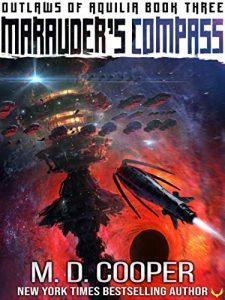 Marauder’s Compass by M.D. Cooper:
Marauder’s Compass by M.D. Cooper:
Jax and the crew of the Lightning Runner have narrowly escaped Sinclair and her DSA fleet, but their troubles are far from over.
The flight from Iydra Station has depleted their antimatter reserves. Without resupply, they’ll have limited options should they run into trouble again—which they fully intend to do. With numerous parties hunting for their ship, Jax must choose their haven carefully.
Penny knows of a secret city within a dwarf planet where they take refuge. However, it doesn’t take long to discover that their enemies have yet again increased in number. With several of the crew captured and the ship trapped, their options are few and drastic.
The mission to infiltrate the Paragonian outpost is in dire jeopardy and Jax must consider making the ultimate sacrifice in order to achieve victory.
And if he fails, all Aquilia will be swept up in war.
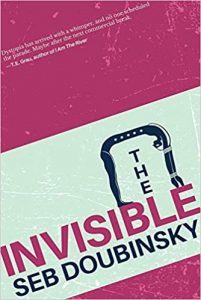 The Invisible by Seb Doubinsky:
The Invisible by Seb Doubinsky:
It’s election time in New Babylon, and President Maggie Delgado is running for re-election but is threatened by the charismatic populist Ted Rust. Newly appointed City Commissioner Georg Ratner is given the priority task to fight the recent invasion of Synth in the streets of the capital, a powerful hallucinogen drug with a mysterious origin. When his old colleague asks him for help on another case and gets murdered, things become more and more complicated, and his official neutrality becomes a burden in the political intrigue he his gradually sucked into. Supported by Laura, his trustful life partner and the Egyptian goddess Nut, Ratner decides to fight for what he believes in, no matter the cost.
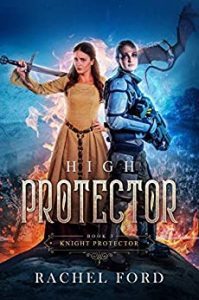 High Protector by Rachel Ford:
High Protector by Rachel Ford:
Kaladorn. Slave born.
Rohana knew her destiny. She’d been born to serve her king, to live and die at his command. She hadn’t questioned when he ordered his armies into the frozen North, to fight a queen who threatened the South.
Except, Queen Ilaria has never been a threat to their nation. On a frozen field of battle, Rohana learns the truth. And she has one moment to make a decision.
One moment, for a slave to rewrite the fate of two empires.
This novel features characters from the first two novels, and introduces new characters. It is a stand-alone novel.
Together again, and ready to bring the system to its knees.
Karin Makos has spent the last two months running from one thing or another—but all that’s about to change. Her sister’s back, and Nomiki’s ready to grab their problems by the horns, throw them on their backs, and rip into them with her modified carbon steel blades.
With the backing of the Fallon Empire and a promising new lead, the two are determined to reach down into the mystery of their past and pull out its secrets, once and for all.
But they aren’t the only ones on the move. And looking may uncover more than even they could have bargained for.
The Eurynome Code space Opera series continued with this unforgettable third installment. Grab your copy today!
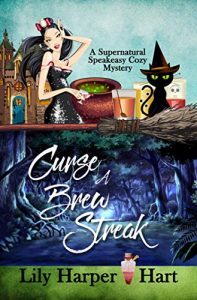 Curse a Brew Streak by Lily Harper Hart:
Curse a Brew Streak by Lily Harper Hart:
Ofelia Archer is living the dream … or as close as seemingly possible.
She owns her own business, her father seems to be on an even keel, and her new relationship with Detective Zacharias Sully is cruising right along. Everything changes in an instant, though, when screams from the street lead to zombies running amok through the French Quarter.
Ofelia is a tough witch who takes no guff but even she is at a loss. Who is creating the zombies? Where are they coming from? They’re not rising from the dead as much as being bumped off and used as an invading army.
Sully wants to take control of the investigation but the higher-ups in the New Orleans Police Department assign the case to a new detective, much to his chagrin. That detective is keen to find answers. Unfortunately, he’s looking hard at Ofelia to find them.
Sully and Ofelia are going to have to work together to find answers. Their adventure will lead them from the French Quarter to the Garden District and beyond. Even then, when things start coalescing, gnashing teeth won’t be the worst of their problems.
Months ago they were two factions working on their own. Now they’re together, and stronger for it.
Not all the magic in the Big Easy is good. Some is evil … and the two sides are about to collide.
En route to a job in the asteroid belt, the transport ship that Jonathan and Gaby are travelling on is required to give assistance to a space station in trouble.
Astoria Station stopped responding to everything except automated messages. Jonathan and Gaby, familiar with disease and habitat collapse, offer to help.
But not even they are prepared for what they find, or the efforts by some to sweep it under the carpet.
Hunter James was my grandfather.
He wanted to end the cycle of war, but instead he broke the world. Demons, vampires, and monsters poured through the Rift into our dimension. The Magi emerged from humanity’s shadows and fought the Rifters, eventually forging an uneasy peace.
For most humans, demons, and Fae, magik and technology are totally incompatible. But some mages are able to manipulate mechanical and electrical devices. They are called magiteks.
My name is Danica James. I’m a magitek and a cop with the Arcane Division. My job is to protect humanity from the monsters. Sometimes the monsters are human.
Mystic Caravan Circus is heading to Charleston and – per usual – trouble is not far behind.
For Poet Parker, who is grappling with saying goodbye to her assistant, she’s looking forward to quiet nights on the beach and quality time with her boyfriend. All that changes when the sea starts giving up its dead … and they appear to be hungry.
Under normal circumstances, zombies wouldn’t be a big deal. They’re slow, lumbering, and easy to dispatch. This infestation is different … and they appear to be controlled by a strange creature long since thought extinct.
Gorgons were believed to be things of myth and legend but one is haunting the beaches of Charleston … in close proximity to the circus and a writer’s retreat. In fact, the nutty individuals spouting fantastical stories and trying to one-up one another in the bluff house overlooking the circus grounds are all suspects because one of them is controlling the gorgon. Finding the individual responsible for causing endless upheaval and death is no easy task, though.
Poet is a fighter but this battle is all-encompassing.
Not every monster is obvious. Sometimes they hide behind human faces.
This time Poet is going to have to wade through layers of darkness to find the light. Surviving to see the final sunrise will take them all working together … and even then they might not be strong enough to claim victory.
Darkness is coming. Will anyone survive to see the dawn?
A survivor on the run
After refusing the laws of her sadistic pack, Skye Markham barely escapes with her life, seeking sanctuary with the feared Blackwater pack. Hunted by her former Alpha and his soldiers, she’s determined to create a life even though she knows they will come for her.
An alpha with a pack to protect
As the next alpha in line, Remy Holt has spent years guarding the Blackwater pack and his family from those who seek to seize control and destroy them. The last thing he needs or wants is Skye Markham and the dangers she brings with her adding to the stress on his pack, but his wolf has a different opinion. He wants her, and after one moment that shouldn’t have been possible, he knows he’ll never be able to let her go.
A bond unlike any other
Skye thought she was finally safe, but as her bond with Remy strengthens, the shifter world starts to break apart at the seams. Missing shifters, a dying population, and pack wars are all causing their sanctuary to crumble around them, and Skye is trapped in the middle of it all. Someone is out to destroy the pack and if they succeed, there will bring down everything Remy has sought to protect and for Skye… maybe there is no such thing as a sanctuary.
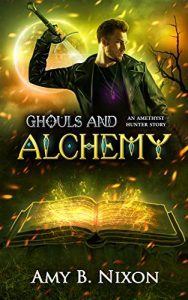 Ghouls and Alchemy by Amy B. Nixon:
Ghouls and Alchemy by Amy B. Nixon:
My name is Nathan Holloway. I was a US Marine before they transformed me into an Amethyst Hunter.
They are Nexus, a covert organization specializing in extracting dead soldiers from the battlefield, reviving them through alchemy and using them for wet work.
Hunting witches and sorcerers, vampires, fae, shapeshifters and magical lawbreakers? That’s the easy part. But being immortal? Well, that’s a different question.
For me, immortality comes with a hefty price tag.
My Materia Prima – the quintessence of every living organism – is growing feeble. Nexus’ remedies have turned me into an addicted junkie. My sardonic cynicisms are rewarding me with more enemies than allies. And the mysterious Alchemist, who gave me a second chance at life, has condemned my soul to the fiery pits of hell.
Things can’t get worse, can they? They can, and they just did.
One of our agents has gone rogue and stolen a supersonic combat aircraft. The country’s under a ghoul invasion. The ghoul-breeding Sa’alin queens are nowhere to be found. And in the midst of it all, we discovered something cunning, vile and even more lethal than the ghouls. Something we thought was erased from existence centuries ago – a necromancer.
Join Nathan as his journey weaves him into a web of ancient alchemy, high-tech science fiction and mythological fantasy.
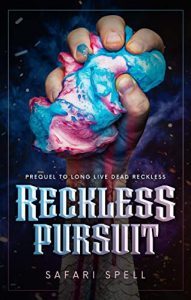 Reckless Pursuit by Safari Spell:
Reckless Pursuit by Safari Spell:
A dragon is no match for love…
As the handsome and charismatic son of a powerful fallen angel, dragon shifter Spencer Kaden has spent centuries seeking pleasure and little else.
So when his father sends him to the backwoods city of Cypress, Georgia, as a sentry for the Grigori, he plans to do what he always does until it’s time to leave – divide, conquer, repeat. But that was before falling in love with his beautiful yet troubled coworker, Talor Gardin.
Grief-stricken from debilitating loss, Talor suffers from panic attacks and deepening depression. She’s in no place to be pursued. But when she begins to spiral, Spencer finds himself torn between who he is and who he wants to be.
Desperate to save her, he must decide if he will risk everything he holds dear by daring to ask a favor of the siren, the powerful and dangerous sworn enemy of the Grigori…or if the price of love is too great a cost.
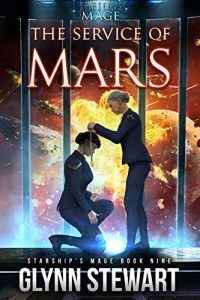 The Service of Mars by Glynn Stewart:
The Service of Mars by Glynn Stewart:
Secrets have been unleashed
Worlds have fallen
A Mage-King has died
But the war rages on!
Secrets and warships combined to turn the tide of the Siege of Legatus, delivering the capital of the Republic of Faith and Reason into the hands of their enemies. With Damien Montgomery called away to lead the entire Protectorate of Mars, fighting the war falls to Mage-Admiral Jane Alexander and Mage-Lieutenant Roslyn Chambers.
As the Martian Second Fleet moves against the remaining Republic worlds, Captain Kelly LaMonte’s covert stealth ship sweeps the worlds away from the conflict, searching for the Republic’s government-in-hiding and a chance to end the bloody conflict.
But this war began in the shadows, and the secrets hidden in those shadows threaten to turn the tide of the war once more—and bring it to the heart of the Protectorate!
For a shifter…
…being stuck in wolf form is torture.
The moment I shifted; my life changed.
After witnessing a traumatic event at a young age, nine-year-old Forrest shifted into her wolf form – and was unable to shift back. Years later and suffering at the hands of her malicious step-brothers, she stubbornly clings to the hope that she’ll turn back into the girl she once was.
But when her magic returns at the moment she needs it most, Forrest is thrust back into the world of humans. There’s only one problem. Her pack is out to kill her.
Struggling to learn how to walk and talk again, Forrest finds herself on the run from the cold-blooded shifter council. But hidden deep within her human form lies a secret – a powerful magic that has the potential to set her free.
If only she can stay alive long enough to master it…
 Invasion by James David Victor:
Invasion by James David Victor:
Undercover behind enemy lines and there’s only one person he can trust. Maybe.
The Skarak have invaded with a force certain to overwhelm all of humanities defenses. To make matters worse, Boyd’s cover in the Faction is on the verge of being blown. Even if he can escape, his chances of survival are thin. Can he trust an enemy who just might turn out to be more of a friend than he ever thought possible? Or will it even matter as the Skarak look to destroy both the Union and the Faction?
Invasion is the third book in the Blue Star Marines series which follows a young man who will have to push his hatreds aside and come to the aid of all humanity.
Download Invasion and see if humanity can overcome itself and survive in the vast darkness of space!
 Send to Kindle
Send to Kindle
August 29, 2020
Cora’s Adventures at the Virtual 2020 NASFiC and More Thoughts on Virtual Conventions
[image error]In January of this year, there were four SFF conventions/events I was tentatively planning to attend, namely CoNZealand, the 2020 Worldcon, in Wellington, New Zealand, Futuricon, the 2020 Eurocon in Rijeka, Croatia, Hinterm Mond in Leer, East Frisia, and , a gaming con in Syke that takes place only 13 kilometres from where I live, i.e. practically next door. Two of these cons have since gone virtual, one that was scheduled for March has been cancelled and one has been postponed until 2021.
Like pretty much everybody, I miss in person cons. I miss meeting old and new friends, I miss listening to panels, I miss strolling through the dealer’s room and most of all, I miss the many great people you meet at every con.
However, there is also a silver lining to the fact that the ongoing COVID pandemic has forced every SFF con that wasn’t cancelled outright to go virtual. Because it means that I can virtually attend cons I would never have attended in person, mostly because they happen on another continent.
One con I would very likely never have attended in person is NASFiC, the North American Science Fiction Convention, which only takes place when Worldcon is outside North America. And if Worldcon is outside North America, I’m more likely to attend Worldcon than any North American convention.
The 2020 NASFiC was supposed to take place in Columbus, Ohio last weekend, but went virtual like pretty much all conventions these days. And I decided to register, because some friends invited me to.
Unlike Worldcon, I wasn’t on programming at NASFiC, so I just watched whatever program items interested me (and took place at a time that worked for me) and chatted a little on Discord, while going about my ordinary weekend.
The first panel I watched was “Fantasy for YA vs. Adults”, featuring Alma Alexander, Farah Mendlesohn, Sherwood Smith and Kathryn Sullivan. I picked this panel over the horror panel going on at the same time, because I knew and liked the panelists. There was some concern in the chat that the panelists were all white. And indeed, more diversity would have been nice, especially considering what a diverse field fantasy in general and YA in particular is.
Talking of the chat, unlike other recent virtual conventions, NASFiC opted not to use the Zoom chat, but have the Discord chat side by side with the panel. From the POV of an audience member, this was a lot better than having to switch between Discord and Zoom in different tabs/windows. Though I’m not sure how it was from the POV of a panelist, since panelists and moderators can more easily see questions, when they are asked in the Zoom chat. There were also several “pure” Discon channels for fan tables, dealers, Worldcon bids, etc…
The “Fantasy for YA vs. Adults” panel also dropped out towards the end due to a technical glitch. When the panel did not come back, I switched to one of the other program rooms. In fact, another feature that I enjoyed about the 2020 NASFiC is that it was easy to switch between the different program rooms, since you didn’t have to enter a whole new Zoom room, but could just switch between tabs on the con homepage. And so I caught the tail end of a reading by Phoebe Barton, an author I briefly met at the Dublin Worldcon last year.
Another panel I attended was the “Fanzine” panel, largely as a point of comparison to the fanzine panel I moderated at CoNZealand. The panelists were Chris M. Barkley, Steven H. Silver and Joel Zakem, the moderator was Anne Gray. Compared to the CoNZealand panel, the NASFiC fanzine panel was more focussed on traditional print zines and transitional zines like File 770 or Journey Planet, which bridge the gap between the traditional print zines and the various digital projects like blogs, newsletters, fancasts and YouTube channels. Meanwhile, in my panel at CoNZealand, we tried to cover both print zines and online zines, while the CoNZealand Fringe fanzine panel focussed almost exclusively on online publications. All these approaches are valid and unlike some others, I think the difference between the print and online zines lies mainly in the medium and not so much in the content. Cause if I look at some old fanzines from the 1930s or 1940s on fanac.org, I find that the topics and content aren’t all that different from what you can find in today’s blogs, newletters, etc…, even if the names and slang are unfamiliar.
ETA: Chris Garcia of Journey Planet and The Drink Tank, who was one of the panelists at the CoNZealand fanzine panel, and his family need help, because they have been evacuated from their home because of the California wildfires and don’t know when and if they can return.
Talking of fanzines, all fanzines, whether print or online, could use some more attention. Because Best Fanzine is inevitably the category which gets the least votes at the Hugo Awards, sometimes barely clearing the 25% No Award hurdle. I find this a pity, because fanzines are doing great work, regardless of medium, and there doing it purely for the love of the genre. I’m not sure why fanzines and fansites aren’t getting more attention, though I suspect that part of the problem may be that the big corporate sites like Tor.com, iO9, The Daily Dot, SyFy Wire, Digital Spy, etc… are sucking attention away from smaller blogs and sites. I also think we should shine more of a spotlight on fanzines and fansites in the run-up to the 2021 Hugos, but that’s a subject for another post.
Another panel I attended was the NASFiC special edition of “The Journey Show”, Galactic Journey‘s regular series of online events. The subjects of the “Journey Show” vary and the subject of this show was art, albeit with a twist. Because the audience gives prompts, which would then be drawn live by a panel of artists and cartoonists. Gideon Marcus was the moderator – the artists were Cathleen Abalos, Lorelei Marcus, Jimmy Purcell and Hugo finalist Alyssa Winans.
This panel was a lot of fun and I enjoyed seeing how the different artists interpreted the prompts – prompty like “lady pirates”, “mermaids with rayguns”, “Nnedi Okorafor creating” (okay, so she wasn’t even born in 1965, but who cares?), “school in space”, “Gideon Marcus as Conan the Barbarian”, etc… I think this is an idea that can also be done very well at a physical con with the resulting drawings subsequently exhibited in the art show.
In general, I find that virtual cons manage to replicate the experience of panels and readings remarkably well. The Discord chats aren’t really a replacement for in person conversations, but they do fulfill their purpose. And while I didn’t attend any parties at NASFiC, I did enjoy the Zoom parties I attended at CoNZealand.
So let’s talk about things that don’t really work at virtual conventions. The dealers’ hall is one of them. Because even though virtual conventions are making efforts to replicate the dealers’ hall experience, scrolling through some online stores just doesn’t offer the same browsing and discovery experience as a physical dealers’ hall. Case in point: If I’m at a physical con, I usually buy something in the dealers’ hall – a t-shirt, a piece of jewellery, books. I have yet to buy something at a virtual convention.
Another thing that just doesn’t work online in cosplay. Because costumes are meant to be seen in person and photos just don’t capture the magic. And indeed, NASFiC had to cancel its masquerade for lack of entries.
Of course, physical conventions won’t be possible again until 2021 at the earliest, because right now stuffing hundreds or even thousands of people into a convention centre, hotel or other venue is just too risky. There is a reason that con crud is a thing. And until we can have physical cons again, virtual cons are a nice replacement.
There also are a lot of virtual cons happening in the next few months and most of them are fairly cheap or even free, so I’m planning to attend others. It’s not just SFF cons either – many crime fiction cons and festivals are going online as well. And while I read and write crime fiction, I rarely attend crime fiction festivals except for Prime Time Crime Time, Bremen’s local crime fiction festival (which won’t take place in 2020). But there are a couple of virtual crime fiction festivals coming up like Bloody Scotland, so why not check them out?
Normally, my con reports are photo heavy, because there are usually a lot of interesting things to see at conventions. But if the con takes place online, there is nothing really to photograph except for my desk, which isn’t very interesting.
So enjoy Oculus and Ophthalmos, the friendly eyeball monsters I made for the CoNZealand yarnbombing project. Unfortunately, I didn’t manage to finish Ophthalmos in time for CoNZealand, so he and his brother Oculus get to brighten up this NASFiC report instead:
[image error]
Oculus and Ophthalmos, the friendly eyeball monsters, brighten up my bookshelves and pose with several Hugo winning works.
 Send to Kindle
Send to Kindle
Indie Crime Fiction of the Month for August 2020
 Welcome to the latest edition of “Indie Crime Fiction of the Month”.
Welcome to the latest edition of “Indie Crime Fiction of the Month”.
So what is “Indie Crime Fiction of the Month”? It’s a round-up of crime fiction by indie authors newly published this month, though some July books I missed the last time around snuck in as well. The books are arranged in alphabetical order by author. So far, most links only go to Amazon.com, though I may add other retailers for future editions.
Our new releases cover the broad spectrum of crime fiction. We have cozy mysteries, small town mysteries, culinary mysteries, historical mysteries, Jazz Age mysteries, WWII mysteries, 1950s mysteries, paranormal mysteries, dystopian noir, police procedurals, crime thrillers, legal thrillers, romantic suspense, police officers, amateur sleuths, private investigators, FBI agents, prosecutors, kidnappers, assassins, amnesiacs, serial killers, perfect murders, arson, crime-busting witches, crime-busting socialites, crime-busting bakers, zombies and much more.
Don’t forget that Indie Crime Fiction of the Month is also crossposted to the Indie Crime Scene, a group blog which features new release spotlights, guest posts, interviews and link round-ups regarding all things crime fiction several times per week.
As always, I know the authors at least vaguely, but I haven’t read all of the books, so Caveat emptor.
And now on to the books without further ado:
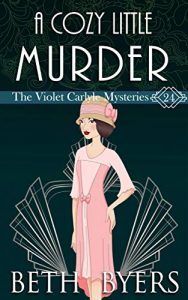 A Cozy Little Murder by Beth Byers:
A Cozy Little Murder by Beth Byers:
September 1926.
Vi and Jack have settled into London for the fall, and they want nothing more than an excess of cocoa, coffee, good books, and time with friends.
They should, however, know better. Jack is brought into consult on a case in coziest of houses. Only all is not what it seems and no one is surprised when they find yet another body.
[image error] Never Surrender by Stacy Claflin:
Alex Mercer thought his worst days were behind him.
Instead, his life is falling apart from the seams. Again. While his marriage is on the brink of divorce, his daughter is once more the target of a potential abductor. Alex will do whatever it takes to keep her safe while working to get to the bottom of the infamous kidnapping ring once and for all.
He believes one of his superiors in the police department to be involved with the criminal mastermind, and he will do anything to prove it. But if his suspicions prove wrong, it will end his career. Alex must weed out friend from foe before his daughter disappears.
His focus is being pulled in so many directions, something is bound to fall through the cracks—and soon. If he can’t keep both his family and job intact, he will lose everything. And this time, there will be no salvaging any of it.
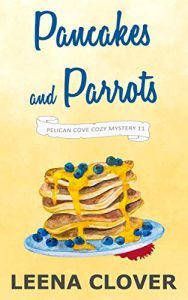 Pancakes and Parrots by Leena Clover:
Pancakes and Parrots by Leena Clover:
Reunions Can Be Murder
The town of Pelican Cove is abuzz with gossip. The infamous class of 1988 is back home for their 30th reunion. It’s a time to indulge in nostalgia and take a trip down memory lane.
Everyone is eagerly awaiting the big event, the grand unveiling of the time capsule. But the gala dinner takes a morbid turn when a man is shot dead.
Petitioned by the grieving widow, local cafe owner Jenny King takes on the belligerent reunion delegates. As long buried secrets begin to surface, Jenny’s sleuthing abilities will be tested.
Meanwhile, the town folk are busy raising funds to help a terminally ill child.
Can Jenny battle a personal crisis, help a devastated mother and navigate petty high school rivalries while she hunts for the true killer?
If you like cozy mysteries with strong heroines, unexpected twists, yummy food and friendships that last a lifetime, you will love Pancakes and Parrots.
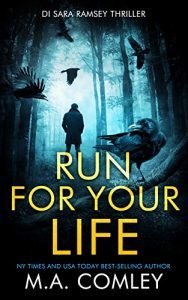 Run For Your Life by M.A. Comley:
Run For Your Life by M.A. Comley:
Time doesn’t heal all wounds.
Five years ago they committed the most despicable crime imaginable.
They thought they were safe…but someone knows.
Has the hunter become the hunted?
DI Sara Ramsey and her team are tasked with solving one of their most complex cases to date – an elusive killer intent on committing the perfect murder.
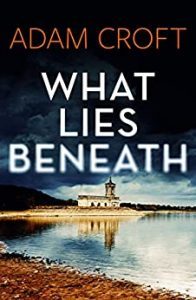 What Lies Beneath by Adam Croft:
What Lies Beneath by Adam Croft:
A peaceful Sunday morning in Rutland is shattered when a dead body is discovered on the rocks at Normanton Church.
The victim has been laid out in a crucifixion pose, facing the altar. DI Caroline Hills is certain there’s a religious connection — one which threatens the tranquility of life in the area.
The killer has gone to extraordinary lengths to make the symbolism clear. And the deaths will continue until Caroline and DS Dexter Antoine uncover the truth behind the dark secret — and what lies beneath.
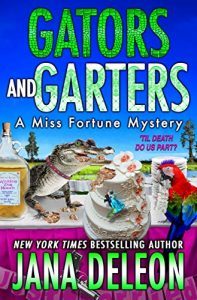 Gators and Garters by Jana Deleon:
Gators and Garters by Jana Deleon:
‘Til death do us part?
Ida Belle, Fortune, and Gertie are gearing up for the big day—Ida Belle’s wedding to Walter—but when the caterer goes missing just a week before the big day, it puts a huge black mark on the joyous celebration. Molly Broussard is no stranger to being in the limelight, so when the former cage fighter turned in her boxing gloves for pots and pans, everyone who knew her was surprised…until they ate her food.
From all appearances, Molly took her boat out that day and simply never returned. An extensive search of the bayous finally produces the boat, but there is no sign of Molly. With no evidence of foul play, Sinful residents are ready to conclude that this is simply another tragic and all-too-common accident.
Nickel Bordelon spent half of his time in trouble and the other half paying for it. But one thing he knows for certain—Molly was murdered. When he asks Fortune to take the case, she isn’t sure there’s anything to find, but his emotional plea has her agreeing to look into it. As Swamp Team 3 begin their investigation, they find more layers to Molly’s disappearance than in Ida Belle’s wedding cake.
 The Invisible by Seb Doubinsky:
The Invisible by Seb Doubinsky:
It’s election time in New Babylon, and President Maggie Delgado is running for re-election but is threatened by the charismatic populist Ted Rust. Newly appointed City Commissioner Georg Ratner is given the priority task to fight the recent invasion of Synth in the streets of the capital, a powerful hallucinogen drug with a mysterious origin. When his old colleague asks him for help on another case and gets murdered, things become more and more complicated, and his official neutrality becomes a burden in the political intrigue he his gradually sucked into. Supported by Laura, his trustful life partner and the Egyptian goddess Nut, Ratner decides to fight for what he believes in, no matter the cost.
November 1940. The Battle of Britain has only just ended and the horror of the Blitz is reaching its height.
Two deaths in rapid succession on the Sussex Downs brings Bunch Courtney and Chief Inspector Wright together once more. What could possibly link a fatal auto accident with the corpse in a derelict shepherd’s hut? The only clue the pair have is a handwritten list of the members of a supper club that meets at London’s Café de Paris. Two of those on that list are now dead and the race is on to solve the mystery before any more end up on the mortuary slab.
Wanted: Effective killer. No experience necessary.
Kaden Rivera expected another dull shift at the restaurant. Instead, the 23-year-old left wearing her own blood.
An armed robber had attacked. She surprised everyone, including herself, by knocking him out. An impressed businessman offers a gig as an assassin, training included. The side job was supposed to be simple.
And it was, until her colleagues start dying. The boss is useless, and police aren’t an option. Her only help is her best friend and a new AI mouse that he dubbed her “assistant.” While still completing assignments, she plummets deeper into the criminal underworld—without her consent.
Her only choice is to claw her way out.
 Curse a Brew Streak by Lily Harper Hart:
Curse a Brew Streak by Lily Harper Hart:
Ofelia Archer is living the dream … or as close as seemingly possible.
She owns her own business, her father seems to be on an even keel, and her new relationship with Detective Zacharias Sully is cruising right along. Everything changes in an instant, though, when screams from the street lead to zombies running amok through the French Quarter.
Ofelia is a tough witch who takes no guff but even she is at a loss. Who is creating the zombies? Where are they coming from? They’re not rising from the dead as much as being bumped off and used as an invading army.
Sully wants to take control of the investigation but the higher-ups in the New Orleans Police Department assign the case to a new detective, much to his chagrin. That detective is keen to find answers. Unfortunately, he’s looking hard at Ofelia to find them.
Sully and Ofelia are going to have to work together to find answers. Their adventure will lead them from the French Quarter to the Garden District and beyond. Even then, when things start coalescing, gnashing teeth won’t be the worst of their problems.
Months ago they were two factions working on their own. Now they’re together, and stronger for it.
Not all the magic in the Big Easy is good. Some is evil … and the two sides are about to collide.
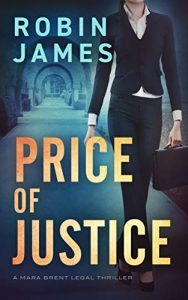 Price of Justice by Robin James:
Price of Justice by Robin James:
Vicious felons are going free. Can one determined attorney stop them from slaughtering more innocents?
Sharp small-town prosecutor Mara Brent has a heart as big as it is tough. Smack in the middle of a scandal surrounding her corrupt ex-boss, she works relentlessly to put things back in order. But when past gross negligence threatens to free convicted criminals, Mara fears her tight-knit community will be plagued by sadistic serial killers.
Preparing for the legal fight of her career, Mara battles to keep a violent pair of brothers locked up. But when the bloodthirsty duo is suddenly released on bail, she finds herself in a race against time to stop their inevitable killing spree.
Will Mara put the brutal murderers back behind bars before she has innocent blood on her hands?
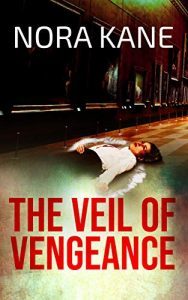 The Veil of Vengeance by Nora Kane:
The Veil of Vengeance by Nora Kane:
The body of the curator of the museum is found in the museum. The only thing missing is a portrait, seemingly of barely any value. The most intriguing thing was the way the body was arranged, with nails shaped in crescent-shaped and a circle of salt around the body. Was it something to do with the occult?
But the big question was why would someone steal the almost worthless portrait when the museum was filled with priceless relics and artifacts.
But the big question was why would someone steal the almost worthless portrait when the museum was filled with priceless relics and artifacts.
Follow Salem Montgomery as she treads the dangerous paths in the sleepy town of Wolverine harbor to track the killer down.
Mystic Caravan Circus is heading to Charleston and – per usual – trouble is not far behind.
For Poet Parker, who is grappling with saying goodbye to her assistant, she’s looking forward to quiet nights on the beach and quality time with her boyfriend. All that changes when the sea starts giving up its dead … and they appear to be hungry.
Under normal circumstances, zombies wouldn’t be a big deal. They’re slow, lumbering, and easy to dispatch. This infestation is different … and they appear to be controlled by a strange creature long since thought extinct.
Gorgons were believed to be things of myth and legend but one is haunting the beaches of Charleston … in close proximity to the circus and a writer’s retreat. In fact, the nutty individuals spouting fantastical stories and trying to one-up one another in the bluff house overlooking the circus grounds are all suspects because one of them is controlling the gorgon. Finding the individual responsible for causing endless upheaval and death is no easy task, though.
Poet is a fighter but this battle is all-encompassing.
Not every monster is obvious. Sometimes they hide behind human faces.
This time Poet is going to have to wade through layers of darkness to find the light. Surviving to see the final sunrise will take them all working together … and even then they might not be strong enough to claim victory.
Darkness is coming. Will anyone survive to see the dawn?
Peter and Mary Marshall went on a vacation with their son and daughter but returned without their children. They went missing from their hotel room one night while the couple was downstairs in the restaurant for dinner.
They never saw them again.
Ten years later, the Marshalls have put the murder of their children behind them, moved to a different state, and had another child, a son.
When he disappears during a vacation trip to Florida, the parents are suddenly in the limelight again. Public opinion seems to be that this can be no coincidence. These things don’t happen twice to the same people, do they?
Former FBI-profiler, Eva Rae Thomas is doing well in her life, and things are calm until an FBI agent suddenly shows up, asking for her help with the case of the missing child.
The kidnapper seems to have a message for Eva Rae since she was the one who supposedly solved the case ten years ago.
As she digs into the disappearance of the boy, racing to save the child’s life, she realizes this psychopathic killer lurking in the shadows has unfinished business, and he’s not stopping till his debt is paid in full.
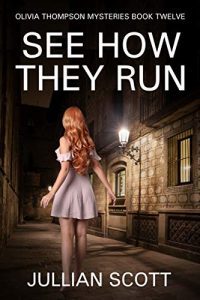 See How They Run by Julian Scott:
See How They Run by Julian Scott:
A dead body in an alley. A hotel with a dark secret.
Olivia and Nate are back in Chicago for an FBI training. It’s supposed to be a relaxing trip away from the kids, but it isn’t long before they are pulled in to help investigate a recent murder. They quickly learn that the young woman found in the alley may not just be an innocent victim.
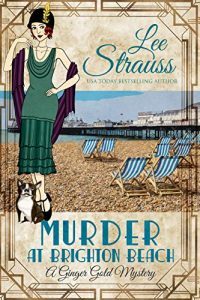 Murder at Brighton Beach by Lee Strauss:
Murder at Brighton Beach by Lee Strauss:
Murder’s a Beach!
A family holiday turns deadly at Brighton Beach. When Ginger and Basil and their family check into the Brighton Beach Boutique Hotel on a lovely warm day in June of 1926, a shocking discovery upsets their plans to relax in the sun and surf. There’s a murderer amongst the holidayers: Is it the starlet? The earl? The disgruntled businessman?
In this Agatha Christie-style addition to the Ginger Gold Mystery series, not only will Ginger not finish her book, she and Basil might not get out of the hotel alive.
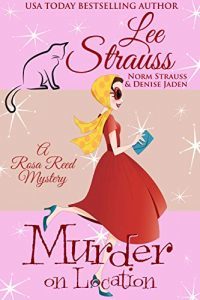 Murder on Location by Lee and Norm Strauss:
Murder on Location by Lee and Norm Strauss:
Murder’s a wrap!
Private Investigator Rosa Reed has finally accepted that her girlhood romance with Detective Miguel Belmonte has no hope of being rekindled, but when his actress girlfriend gets embroiled in a murder on her movie set, it’s more than a movie schedule that’s upsetting. Can Rosa put aside matters of the heart long enough to help Miguel solve the case?
 Burning Girl by Robb T. White:
Burning Girl by Robb T. White:
Detective Riisa Jones is a new detective with her first case as lead investigator for the Gallion, Rhode Island P.D. It’s a bad one: the body of a young woman has been set ablaze in a dumpster behind a local tavern, well known to the cops. Some of her colleagues, including her own partner “Kaz,” a veteran cop nearing retirement, wouldn’t mind seeing her fail. Riisa’s first obstacle is identifying the body. Before long, she’s neck-deep in a case that twists out of her reach every time she follows a lead. Those dead ends are piling up and so is the pressure to solve this horrific case. Riisa finds herself digging past the lies of respectable people to uncover some dirty secrets, and she had better hurry because there are killers behind those liars who are watching and paying attention to her.
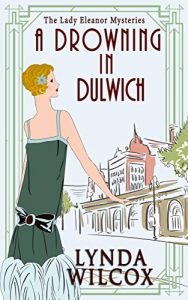 A Drowning in Dulwich by Lynda Wilcox:
A Drowning in Dulwich by Lynda Wilcox:
London 1924.
Private enquiry agent Lady Eleanor Bakewell looks forward to a relaxing few days at the Cuthbert Health and Beauty Clinic, where Irene, the owner, claims to have rediscovered the beauty secrets of Ancient Egypt.
But, when Irene is drowned in the clinic’s exotic Egyptian pool the pampering has to stop.
Convinced her death is murder, and that everyone in the house has a motive, Eleanor must uncover more than just beauty secrets if she is to bring a killer to justice.
[image error] Unshakeable Faith by Lisa Worrall:
“I have no idea who I am.”
Brody Tyler is the owner of a successful bar in San Antonio. Life is good. All that’s missing is someone to share it with. When a desperate stranger walks into the bar with no memory of who he is, Brody knows he must help him. Offering him a job and a place to say seems the right thing to do. Falling in love with him is easy.
Nash, a name he picked himself, is lost when he walks into Brody’s bar. He’d spent the last three months in hospital and had been left with no memory and nowhere to go. Brody’s offer of a job and a place to stay is insane – but Nash instinctively knows he can trust him. Falling in love with his white knight, however, is unexpected.
When tragedy strikes, their perfect world comes crashing down around them. In a twist of fate and mistaken identity, Brody finds himself Nash’s protector once more and he will do anything to keep him safe.
 Send to Kindle
Send to Kindle
August 25, 2020
Why the Retro Hugos Have Value
Once again, this is not the post I wanted to write. I had been planning to review The Old Guard, which I finally got around to watching, and maybe write a quick con report about the virtual 2020 NASFIC.
However, the fallout from CoNZealand continues to suck all oxygen out of the room. The good thing is that the con coms of the upcoming Worldcons DisCon III and Chicon and as well as those bidding for future Worldcons have learned from some of the problems at CoNZealand. The bad thing is that they haven’t necessarily learned the right lessons.
The Memphis Worldcon bid for 2023 has posted a statement about their commitment to diversity and inclusion, which is a good thing. Unfortunately, they also felt the need to let us know in that statement that they don’t intend to hold the 1948 Retro Hugos, if their bid wins. The full statement is here and a detailed discussion may be found at File 770. There also are two proposals by David Wallace and Camestros Felapton, which would basically result in a Retro Hugos light (only one or two categories per year at the discretion of a given Worldcon).
Now I do have some sympathy for the reluctance of Worldcons to hold Retro Hugos, because the Retro Hugos mean a lot of work and extra expenses and the participation could be better. We should maybe also rethink whether the Retro Hugos really need a trophy with an elaborate base and a dedicated ceremony, since the winners are all dead (though one 1945 Retro Hugo winner, the Best Dramatic Presentation co-winner The Canterville Ghost, still has a surviving castmember, Margaret O’Brien, now 82 years old) and descendants often aren’t present to accept the award either.
However, I don’t see the need to make a decision about the Retro Hugos now, since no one expected a statement three years before the con. CoNZealand didn’t announce that they were going to hold the 1945 Retro Hugos until late 2019, a few months before the con. And because the 1946 Retro Hugos were already held in 1996, there won’t be any Retro Hugos until 2022 anyway, so there really was no need to make a statement now. And there was certainly no need to make a statement regarding the 1948 Retro Hugos in the context of a statement on diversity and inclusion, since that implies that the Retro Hugos and an interest in older SFF in general are considered so offensive now that they violate the ideals of diversity and inclusion. And yes, this was maybe not the intention, but that’s how it comes across.
Besides, most of the criticism of CoNZealand focussed on the 2020 Hugo ceremony. I have already written thousands of words about the 2020 Hugo ceremony and linked to other people’s takes on it and the short version is, “Yes, the criticism of the 2020 Hugo ceremony and host George R.R. Martin is absolutely justified, because the ceremony was a disaster.”
A lot of the criticism focussed on Martin’s and Robert Silverberg’s endless reminiscing about “the good old days” and particularly the drinking game worthy frequency with which Martin mentioned John W. Campbell. Again, those criticisms are absolutely justified, because a current year Hugo ceremony is no place to reminisce endlessly about events that happened before many of the finalists were even born.
However, somehow the criticism of the 2020 Hugo ceremony has become conflated with the 1945 Retro Hugos, where the winners included John W. Campbell and the Cthulhu Mythos as well as Leigh Brackett, Margaret Brundage, Clifford D. Simak, Ray Bradbury, Fritz Leiber, Superman, The Canterville Ghost and Curse of the Cat People (as well as the fanzine Voice of the Imagi-Nation, which some people also have problems with). Of course, there was nothing wrong with the 1945 Retro Hugo ceremony (and it was much shorter than the regular one) except some technical issues and that it had to share a timeslot with the Sir Julius Vogel Awards, leaving the Sir Julius Vogel Award winners feel shafted. However, many complaints about the 1945 Retro Hugo winners focussed solely on the wins for Campbell and Cthulhu (and sometimes Voice of the Imagi-Nation), but completely ignored all other winners. The overwhelming majority of those complaining were also people who had paid zero attention to the Retro Hugos before, who didn’t bother to nominate and probably didn’t bother to vote either, who never discussed the finalists or tried to boost finalists they find less objectionable than Campbell and Cthulhu. Again, I have already discussed all this in great detail here and here.
Now no one is obliged to care about the Retro Hugos. However, if you didn’t nominate and vote, you don’t get complain about the results. I also understand the frustration that Retro Hugo voters keep voting for familiar names like John W. Campbell and weak early stories by future stars of the genre over better works, because I share it. However, unlike many other folks, I didn’t complain, but decided to do something about it, so I started the Retro Hugo Recommendation Spreadsheet and Retro Science Fiction Reviews to help potential Retro Hugo nominators and voters make more informed choices. Because I believe that it’s better to try and fix something than destroy or abolish something that some people enjoy.
And while I understand why Worldcons are reluctant to give out Retro Hugos due to the work and expense involved, I really don’t understand the intense hatred they engender in some fans. There are a lot of things going on at Worldcons that I personally don’t care about, but that doesn’t mean I want to take those things away from the people who do enjoy them. I simply focus on the things that give me joy and ignore the rest.
However, the current campaign against the Retro Hugos is part of a larger trend to dismiss the past of our genre as racist, sexist and irrelevant. Also witness the recent debate about the SFF canon, what it is and whether it is relevant with contributions by John Scalzi (here and here), Nina Allan, Camestros Felapton (here and here), the Hugo Book Club, Font Folly, Steve Davidson, Doris V. Sutherland and others. The canon discussion is mostly civil (and the only uncivil are the usual idiots I haven’t linked here) and also makes a lot of good points, such as that there is no one fixed SFF canon, but that individual people have different works which are important to them, that canons can be abused as a form of gatekeeping, that it’s not necessary to read classic SFF works, unless you enjoy them or want to write an academic work about SFF. However, pretty much everybody who is interested in older SFF has experienced hostility about this interest, even if we don’t go around and tell people that they’re not “real fans” (TM), unless they have read the entire output of Heinlein, Asimov, Lovecraft, etc… (and in that case, I wouldn’t be a “real fan” (TM) either). Witness Jason Sanford saying that the Retro Hugo voters are “a small group of people stuck in the past giving today’s genre the middle finger”, never mind that most Retro Hugo voters are Hugo voters as well. Or the person who called me a Nazi on Twitter for tweeting about the Retro Hugo winners, until I blocked them.
As I said before, no one has to care about older SFF and no one has to read it, if they don’t want to. But attacking people for being interested in older SFF and enjoying the Retro Hugos is not okay. Nor is everybody who’s interested in older SFF a reactionary fascist, even if received wisdom claims that the SFF of the golden age was all racist and sexist stories about straight white American men in space, lorded over by the twin spectres of Campbell and Lovecraft.
There is just one problem: The received wisdom is wrong. Because the golden age (intended here as a designation for a specific time period, not a value judgment) was more than just Campbell and Astounding. It was also a lot more diverse than most people think, as I explained in a three part post last year.
True, John W. Campbell did have an outsized influence on science fiction of the 1940s due to a combination of genuine skill as an editor, an eye for promising writers and knowledge of what the audience he cultivated wanted to read as well as the stroke of luck that Astounding Science Fiction had the considerable financial clout of the Street & Smith publishing empire behind it, allowing Campbell to pay better than his competitors and on acceptance, whereas the father of Robert E. Howard had to pester Weird Tales for missing payments until 1942, six years after Howard committed suicide. And because Astounding was the highest paying SFF mag, he pretty much got the first right of refusal for every science fiction story written between 1937 and 1950, unless the author managed to sell it to the even better paying so-called “slicks” or really didn’t get along with Campbell. Would Campbell’s influence have been as great, if he had wound up as editor of – say – Startling Stories or Thrilling Wonder Stories? I doubt it.
Campbell’s influence was further exarcerbated by anthologists who reprinted a lot more stories from Astounding than from other magazines. For example, The Great Science Fiction Stories anthologies edited by Isaac Asimov and Martin H. Greenberg often have a significant overlap with the Retro Hugo finalists for the respective year and mainly collect stories from Astounding with a few other magazines thrown in. However, Asimov was part of Campbell’s stable of writers, shared Campbell’s vision of science fiction to a certain degree (though he was known to subvert it on occasion) and supported the myth that Campbell saved science fiction from rayguns and bug-eyed monsters and made it respectable. And having read some of a letters a very young Isaac Asimov wrote to various science fiction magazines during the 1930s, often to complain about the horror of their being women in those stories, it’s clear that making science fiction respectable and getting rid of all of those bug-eyed monsters and women in brass bikinis was important to him. Meanwhile, Asimov is on record for disliking Weird Tales, which he called “a hoary old institution”. The choices he made for the anthologies he edited obviously reflect his biases.
Talking of Weird Tales, there is quite a lot of scholarship about the magazine and its writers – however, most of that scholarship focusses solely on H.P. Lovecraft and Robert E. Howard and their overlapping circles. However, if you flips through an actual issue of Weird Tales – a lot easier thanks to the magic of the Internet Archive, since physical issues can cost hundreds of dollars – you’ll quickly see that there was a lot more to the “unique magazine” than just Lovecraft and Howard, Cthulhu and Conan. In fact, the Lovecraftian horror stories and early sword and sorcery are in the minority in the actual magazine, outnumbered by gothic horror, ghost stories, occult investigators and proto-urban fantasy. Weird Tales‘ most popular author was not Lovecraft or Howard but Seabury Quinn, whose stories about the occult detective Jules de Grandin and his partner Doctor Trowbridge repeatedly saved Weird Tales from the brink of bankruptcy. Personally, I don’t quite get the popularity of the Jules de Grandin stories – Manly Wade Wellman’s John Thunstone and Judge Pursuivant stories are much better examples of the occult detective genre – though the not so subtle hints that Jules de Grandin and Doctor Trowbridge are more than just good friends are certainly interesting. If you look at an actual issue of Weird Tales, you’ll also note how many women writers and readers the magazine had and how little is known about them. Would we know more about Allison V. Harding, one of the ten most prolific contributors to Weird Tales, if Robert Weinberg had not dismissed her stories “as fillers that just take up space”?
But just as Weird Tales was more than just Conan and Cthulhu, Campbellian science fiction with its competent white male protagonists and its focus on “hard” science (which often turns out to be nonsense upon closer examination) was only one strand of SFF in the 1940s. There was a whole galaxy beyond Campbellian science fiction and even Campbell published a lot of non-Campbellian stories such as the City cycle by Clifford D. Simak, “No Woman Born” and “Judgment Night” by C.L. Moore or “The Children’s Hour” by Henry Kuttner and C.L. Moore, all of which are excellent. However, the stories found in Weird Tales, Planet Stories, Amazing Stories, Thrilling Wonder Stories, Startling Stories, Super Science Stories, Famous Fantastic Mysteries, etc… are often more interesting than those published in Astounding. Not to mention the stories and novels published beyond the confines of the American pulp magazine market. But stories not published in Astounding are more likely to be forgotten because of the prevalent narrative that Astounding was the best magazine of the era. And indeed, I came across a lot of great stories in the course of the Retro Reviews project that have never been reprinted at all, while a stinker like “Deadline” by Cleve Cartmill (a story even its author disliked) did rack up several reprints and translations over the years, even though the only thing of interest about that story is the handy primer on how to build an atom bomb that is hidden inside a page of bad technobabble.
Another issue – and one that should surprise absolutely no one – is that women authors are more likely to be forgotten than men. Not that there aren’t plenty of men who are forgotten as well – who is still familiar with Emil Petaja, Carl Jacobi, Nelson S. Bond or Albert de Pina (very likely one of the few Latinx SFF authors of the era) these days? However, the only women SFF writers of the golden age who are still remembered nowadays are C.L. Moore and Leigh Brackett and even their works are not always easy to find. For example, Leigh Brackett’s Shadow Over Mars, this year’s Retro Hugo winner for Best Novel, is out of print. And a lot of C.L. Moore’s collaborations with Henry Kuttner have been reprinted under his name alone. Meanwhile, other women SFF writers active during the golden age like Margaret St. Clair, Allison V. Harding, Mary Elizabeth Counselman, Dorothy Quick, Alice-Mary Schnirring, Greye La Spina, Leslie F. Stone, Mona Farnsworth, Clare Winger Harris, Jane Rice, Lilith Lorraine (one of the few indigenous writers of early SFF), Ruth Washburn, etc… are barely remembered at all, even if some of them were popular authors during their lifetime. Some of these women are so obscure that we don’t know anything about them at all – all we have are the stories they wrote in the scanned pages of yellowing pulp magazines.
Every twenty years or so, we seem to be experiencing a surge of women and writers of colour entering the genre, making a splash, winning awards and generating headlines like “Women and people of colour are writing SFF now”. But then, those women and writers of colour are pushed out, ignored and forgotten, until the next batch comes along. Witness how the golden age became the realm of Campbellian white dude science fiction and how Weird Tales, the most woman-friendly magazine of the era, was reduced to Conan and Cthulhu, Howard and Lovecraft with everybody else forgotten. Witness how the women writers of the silver age were dismissed as “little housewives writing domestic stories set in galactic suburbia” by those who came after them. Witness how the Cyberpunks consigned the feminist SFF of the 1970s to the memory hole as boring and irrelevant. Witness how women writers of epic fantasy of the 1970s and 1980s are forgotten and ignored, while Robert Jordan, Raymond Feist and Terry Brooks are still considered important voices. Witness how the SFF community managed to completely ignore the many women writing urban fantasy, romantic space opera, paranormal romance, time travel romance and YA SFF to great success in the 1990s and 2000s, while celebrating men writing singularity fiction and New British Space Opera? Do today’s champions of “The past is irrelevant, the golden age is now” honestly believe that it will be different this time around? Because I’m pretty sure it won’t be.
And that’s why reading older SFF is important. Because if you actually read the stuff, you’ll quickly see that pretty much every bit of received wisdom – the golden age was all Campbell and competent white dudes in space and everything before was crap, the SFF of the late 1950s/early 1960s was just boring domestic galactic suburbia stuff until the New Wave came along, the science fiction of the 1970s was boring and irrelevant and only the cyberpunks made the genre relevant again, women and writers of colour did not write SFF before 1965/1990/2010/insert date here – is wrong. And that the genre was a lot more complex, a lot more diverse and a lot more interesting than than the one-note received wisdom narratives imply.
If you dive into old SFF, you’ll find great stories that have been forgotten and classics who have experienced a visit from the suck fairy. You’ll find trends and whole subgenres cropping up decades before they had a name (and not just obvious suspects like sword and sorcery either, but also a lot of urban fantasy and military SF years before they became subgenres), you’ll find stories that are decades ahead of or behind their time. You’ll also find that writers and fans seventy-five or fifty years ago were already discussing a lot of the issues we are still discussing today, albeit in different terms than we would use today.
There are discussions about sexism, racism and diversity – often phrased with cringeworthy clumsiness, but nonetheless present. You had people like a fan writer named Harold Wakefield unearthing “forgotten fantasists” in the pages of the fanzine The Acolyte (and how frustrated would Harold Wakefield be, if he knew that we still have to do the same thing today?). There are strong female characters to be found in the stories of the golden age and some of them even pass the Bechdel test. There are characters of colour, quite a few in fact. There are interracial relationships, which either pass unremarked or where the story makes an explicit point that banning interracial relationships is wrong (Robert E. Howard of all people addressed the issue repeatedly in his Kull stories and at one point literally had Kull smash miscegenation laws with his battle axe). There are sex scenes, some of them quite frank. There are references to drug use. There are subtle and not so subtle hints that some people are gay and that there’s nothing wrong with that. There are even transgender characters, either coded in magical sex change stories such as “Adept’s Gambit” by Fritz Leiber, which will be denied its chance at Retro Hugo glory by the decision of the Memphis Worldcon bid, or addressed outright like in the 1962 story “Roberta” by Margaret St. Clair, which I reviewed for Galactic Journey last year. There also are a lot of explicitly anti-colonialist and anti-capitalist stories, many of them published in that bastion of Socialism and anti-colonialism Planet Stories. To reduce the golden age to just Campbellian science fiction and Lovecraftian horror is to deny the existence of all of those other stories.
Steve J. Wright, comrade-in-arms on the Retro Reviews project, makes some very similar points to mine in this great post on his blog. He also wonders whether our efforts to make the Retro Hugos better and unearth all of the interesting stuff that was going on beyond Campbellian science fiction are futile, since the Retro Hugo voters keep voting for familiar names like Campbell and Heinlein or those truly dreadful Buck Rogers comics anyway. However, as Steve also notes, we have been making some headway. There was a radio drama on the Best Dramatic Presentation ballot and several more on the longlist. The Best Related Work category likely wouldn’t have existed without the Retro Hugo Recommendation Spreadsheet and the work done by Steve, N. and others to track down potential nominees. I also doubt that nigh forgotten writers like Allison V. Harding and Dorothy Quick would have made the longlist, if not for our efforts. Ditto for Babette Rosmond, editor of The Shadow and Doc Savage, who just missed the Best Editor ballot. And talking of editors, should we make a push to put John W. Campbell’s long suffering editorial assistant Kay Tarrant on the ballot for future Retro Hugos, in case they still exist. And I hope they will, because frankly, it’s frustrating to have the whole project cut short, just as we were making headway, because some people who never paid any attention don’t like the results.
Besides, as Steve also says, just giving up would mean abandoning the history of our genre to the reactionary fans and to the received wisdom that Campbell was the greatest editor of the 1940s and that Campbellian science fiction ruled. Because the reactionaries are not giving up. Retro Hugos or not, they’re still here and they’re still pushing their version of what the gilded past of our genre was like. And if no one counters them, that narrative will be the only one there is.
In his post on the Retro Hugo debate, Camestros Felapton points out that the Far Right of our genre – various offshots of the Sad and Rabid Puppy campaigns as well as some established Lovecraft and Campbell fanatics – are actively trying to claim the pulp era for their movement. They can’t quite agree which parts of the pulp era to claim for their own – some of them favour Campbellian science fiction and some of them hate Campbell with the same passion as their political opposites – however, their idea of what pulp SFF was like is highly reductionist and sometimes downright wrong. Hence, you get such howlers that sword and sorcery was a quintessentially masculine genre and that women can’t write it (they grudgingly admit the existence of C.L. Moore and Jirel of Joiry, but declare her “not really sword and sorcery”) and that hardly any women were reading Weird Tales, even though the letter columns indicate a high percentage of female readers. You get claims that SFF of the pulp era was steeped in Christian values, which again is very wrong. You do find stories wherein Christianity plays a role and is explicitly addressed such as Leigh Brackett’s “The Veil of Astellar”, C.L. Moore’s Jirel of Joiry stories, C.S. Lewis’ Space Trilogy and Ross Rocklynne’s “Intruders from the Stars” (which was a lot more entertaining than it has any right to be), but such stories are in the minority. Finally, you also get people claiming that golden age science fiction was all apolitical fun with no political or social messages at all, which is complete nonsense, whether it’s the “genocide is good” messaging of “Arena” by Fredric Brown or the fact that many of Leigh Brackett’s protagonists are literal social justice warriors.
Now other people may disagree, but I for one am not willing to abandon the past of our genre to the dominant narrative that it was just straight white American men being competent in space and straight white men being incompetent in the face of Lovecraftian horrors nor am I willing to let the reactionary forces continue to dominate the discussion about vintage SFF.
Do we need Retro Hugos to discuss, reappraise and honour vintage SFF? Not necessarily, but they are a useful vehicle to raise the profile of worthy older works which may have been overlooked. Plus, the intense focus on a single year is a good thing, because ideally it makes you look beyond the usual suspects and the stories and authors you have loved for ages.
However, Retro Hugos or not, I am going to continue discussing vintage SFF. Because I enjoy it and I’d rather talk about a story that no one has talked about in seventy or eighty years than offer the umpteenth hot take on Network Effect or Harrow the Ninth or The City We Became to the world, even though I liked all of those books, too.
 Send to Kindle
Send to Kindle
August 17, 2020
Retro Review: “Gambler’s Asteroid” by Manly Wade Wellman
There are no space walrusses in “Gambler’s Asteroid” either
“Gambler’s Asteroid” is a space opera short story by Manly Wade Wellman, that was published in the Spring 1944 issue of Thrilling Wonder Stories and would have been eligible for the 1945 Retro Hugo Award. The story may be read online here. This review will also be crossposted to Retro Science Fiction Reviews.
Warning: Spoilers beyond this point.
The titular gambler’s asteroid is 624 Hektor (spelled “Hector” in this story), which in this story’s version of the pulp science fiction shared solar system has been encased in a bubble of glassite and had its spin sped up by atomic engines to create artificial gravity (Hector is too small to have much in the way of natural gravity) on the inside of the glassite bubble. So all of the characters in this story are walking around on a glass floor with the stars below them. An enterprising Venusian than turned Hector into a sort of interplanetary Las Vegas or rather Atlantic City, considering that the Las Vegas we know today is largely a postwar phenomenon.
Our protagonist is Patch Merrick, a not very successful gambler, who has just bet his last value-units on a card game named Indemnity. The game is fictional, but Wellman explains how it works in a quick paragraph. Not that it matters much, because Merrick loses in the second round anyway.
Wellman now gives us some backstory about Merrick and his tentacled and telepathic Martian pal Zaarrgon. Turns out that Merrick and Zaarrgon are fugitives on the run. Zaarrgon is another of those social justice warriors that certain quarters still claim did not exist in golden age science fiction. He stole water to help his fellow Martians who were dying of thirst and thus attracted the attention of the Martio-Terrestrial League. I can’t help but wonder whether this organisation is a rebrand of Leigh Brackett’s Terran Exploitation Company. “Hey, we’re still an evil bloodsucking company, but at least out new name is a little less blatant about it.”
Zaarrgon ended up in prison, facing execution, and Merrick, who refers to himself as “guilty of sentimentality”, broke him out. As a result, Merrick lost his promising career and his fiancée Morgana Conti, daughter of the wealthy Coburn Conti, and was forced to flee with Zaarrgon to the lawless asteroid belt. They stopped on Hector, hoping to win enough money – pardon, value-units – to buy supplies for their space cruiser and continue their escape. However, Martians are banned from gambling on Hector due to being telepathic and Merrick turns out to be really crap at gambling, so they’re soon out of money and supplies.
The game that Merrick was playing normally ends with all players, including those who dropped out, comparing their totals. The highest total wins. Merrick had good cards. However, he and Zaarrgon are broke and the stakes are too high for them, so Merrick wagers their space cruiser instead. There is obviously no way this can go wrong.
However this time, Merrick gets lucky and beats not just a fellow human player named Mr. Alabaster, but also the house. Now he and Zaarrgon have more than enough to resupply their ship.
Mr. Alabaster, on the other hand, is not happy at all, because he was on Hector to do a job and the money he just gambled away was expense money. Turns out he is a bounter hunter, albeit a very inept one, who is supposed to hunt down Merrick and Zaarrgon on behalf of Morgana Conti and her father. Zaarrgon is still scheduled for execution. As for Merrick, his fate will be worse, at least according to Alabaster, because Morgana Conti still wants to marry him. As for Alabaster, he wound up with the bounty hunting job, because he’s a friend of the Conti family and Morgana hired him. However, she did not consider supplying Alabaster with photos of Merrick and Zaarrgon, which seems like an odd oversight.
Zaarrgon gives the luckless Alabaster his money back and tells him that the fugitives are headed for the moons of Jupiter to throw him off their scent. Not that it helps much, because Zaarrgon and Merrick are arrested anyway by casino security guards who overheard their conversation with Alabaster.
And so Zaarrgon and Merrick end up in prison, while the casino security chief, a froglike Venusian named Lirog, immediately calls Morgana Conti and asks if the prisoners are the fugitives she seeks. Morgana confirms this, doubles the reward and declares that she will pick up the prisoners herself. Alabaster shows up again as well to gloat, because Morgana will pay him a handsome reward as well.
While Merrick and Alabaster are arguing, Zaarrgon uses one of his tentacles to steal a guard’s handy rust raygun and uses it to reduce the lock of their cell to rust. Merrick knocks out a guard and the two fugitives are on the run once more.
On their way back to their space cruiser, they steal some of the atomic fuel for the engines which keep Hector spinning. There is some brief technobabble that Hector was once the centre of a planet that broke apart to form the asteroid belt, which is why powerful atomic fuel can be found there. Fuel powerful enough to take Zaarrgon’s and Merrick’s space cruiser beyond the solar system, though what they plan to do there is anybody’s guess.
They reach the docking bay of their cruiser, Merrick knocks out two more guards and Zaarrgon, who’s clearly the brains of this outfit, uses the rust ray he borrowed to weaken the frames of the glassite sheets and blow a hole into the bubble that envelops Hector, which will both allow the space cruiser to escape and keep everybody on the asteroid so busy with repairing the breach that they won’t have time to follow the fugitives.
The plan works, too. Merrick and Zaarrgon escape and head for another asteroid to purchase supplies, since luckily no one thought to relieve them of their winnings before throwing them into prison.
However, as Merrick and Zaarrgon make their escape aboard their space cruiser, they receive a call from none other than Morgana, who informs them that her plan worked.
When Merrick points out that her plan didn’t work, because he and Zaarrgon escaped, Morgana reveals that she wanted them to escape and made sure they would. She sent Alabaster after them, because he is the stupidest man she knows and a compulsive gambler besides. Then she bribed the card dealer to make sure that Alabaster lost all his expense money to Merrick, allowing Morgana to secretly finance Merrick’s escape.
However, the card dealer informed Ligon, the casino security chief, who then decided to arrest Merrick and Zaargon to get the reward himself. Merrick once more tries to reassert his independence by telling Morgana that he and Zaargon broke out on their own.
“That’s what you think”, Morgana says and reveals that she paid Alabaster to smuggle the rust gun into the prison, allowing Merrick and Zaargon to escape. Merrick is dumbfounded and Morgana tells him that he can’t come home now anyway, because he’s still a wanted man and because there are still many things that Morgana has to fix. And besides, she knows that Merrick isn’t ready to settle down just yet, but once he’s had enough of adventure, he’ll come back to her.
The story ends with Merrick moping and Zaarrgon babbling about asteroids and the creation of the asteroid belt and wondering why Merrick is moping. I take it back. Zaarrgon is not the brains of the outfit, he and Merrick are both idiots in their own way. Morgana, on the other hand, is awesome.
I have to admit, I only read this story, because I flipped forward through the Spring 1944 issue of Thrilling Wonder Stories after reading “Unsung Hero” by Ruth Washburn and came across this story – after two pages of “incredible but true Scientifacts”. The interior art – showing an anthropomorphic frog and a man in a cage ogling an attractive woman – looked intriguing enough and besides, I like Manly Wade Wellman‘s writing, so I decided to read it. I’m glad that I did, because this is a fun space opera adventure that manages to pack a lot of plot into only six pages.
If I have one complaint about “Gambler’s Asteroid” it’s that it’s too short. With the amount of plot and backstory there is, this could easily have been a novella, if not a novel. The glassite encased asteroid Hector is a fascinating setting, which I would have loved to explore more. I also would have loved to see Merrick break Zaarrgon out of prison and learn more about Merrick’s relationship with Morgana and her father and just what his life and promising career were like, before he decided to free Zaarrgon. And of course, I would have loved to see more of Morgana than two brief videocalls, because Morgana is awesome.
Intergalactic gambling dens are a space opera staple these days, whether it’s Canto Bight and Bespin of Star Wars fame (okay, we never actually see any gambling on Bespin, but you know it’s going on somewhere, considering who runs the place), Stardust City in a recent Star Trek: Picard episode as well as a lots of other intergalactic gambling dens in pretty much every Star Trek series to date, the casino planet Carillon in the original Battlestar Galactica or The Scuttling Cockroach, where Mikhail and Anjali rescue Pietro Garibaldi and get themselves into trouble in my own Freedom’s Horizon. However, Hector is the granddaddy of all of those intergalactic gambling dens. I’m not sure if this is the first intergalactic gambling den to ever feature in science fiction – most likely it’s not. But it’s definitely a very early example.
These days, Manly Wade Wellman is mainly remembered for his (very good) occult detective and folk horror stories – indeed, I reviewed one of them. But like most authors of the pulp era, Wellman was a man(ly) of any talents, who also wrote science fiction, mystery and crime fiction, comic books (a Spirit comic he wrote was nominated for the Retro Hugo this year) and historical non-fiction and who was even nominated for a Pulitzer Prize and won the Ellery Queen Mystery Magazine Award over William Faulkner. However, Wellman’s science fiction stories, particularly his space opera tales from the 1930s and 1940s, are less well known than his fantasy and horror stories. At least based on “Gambler’s Asteroid”, I think that’s a pity.
Wellman’s skills as a writer are clearly evident in this very short story. In a few lines and paragraphs, he manages to sketch a fascinating setting by sprinkling in details like “Venusian chirp-water music”, a “Martian joy-lamp shedding stimulus rays overhead” or the popular Martian genre of “formalised comi-tragedy”, all of which are attractions on offer on the glassite floors of Hector. Wellman also had a dry humour that sets his work apart from other pulpy space opera tales of the era.
Like too many of the stories I have reviewed here at Retro Reviews, “Gambler’s Asteroid” has never been reprinted. I sincerely wonder why, because there is a lot to like about this fun space opera caper.
 Send to Kindle
Send to Kindle
August 15, 2020
Cora’s Adventures at CoNZealand, the Virtual 2020 Worldcon, and Some Thoughts on Virtual Conventions in General
[image error]So far, I’ve talked a lot about the Hugo ceremony at CoNZealand, the virtual 2020 Worldcon, but little about the con itself, which is a pity, because CoNZealand was actually pretty good, all things considered.
Normally, this would be a post with lots of photos of panels, exhibits, parties, the convention centre, the Hugo ceremony, the Hugo reception and after-party, etc…. However, due to CoNZealand going virtual like most other cons this year (the ones that weren’t cancelled outright), the convention centre was my office. Which had the advantage that I didn’t have to dash from panel to panel and that I could make myself tea or empty the dishwasher in between panels. Food was always in easy reach and cheaper as well as more nutritious than the usual convention centre grub.
However, there were also new challenges such as “No, Mom, I don’t mind if you want to watch Hawaii Five-O or NCIS or whatever on my TV, but you have to be out of here by half past ten, because I have a panel at eleven.” Another issue is that if the con takes place at home, there is some pressure to keep working anyway, which wouldn’t be there if I had been on the other side of the world in New Zealand. And so I slept in the morning, taught virtual German classes in the afternoon, was at Worldcon by night and also translated someone’s citizenship renunciation certificate in between. Oh yes, and I was still doing the July Short Story Challenge, too, for the first few days of the con, though I only managed a couple fo flash pieces (the post-mortem is coming soon, I promise). I also made sure to take a short daily walk throughout the con.
As you can see from the program schedule I posted shortly before the con, I had a lot of programming this time around. I was on five panels and moderated three of them. I also had a virtual table in the dealer’s hall, something I haven’t done before, either virtually or in person. And then there was the neverending Hugo ceremony from hell, a dealers’ hall reception, etc… In short, I had a busy Worldcon.
My first panel was the “Evolution of Fanzines” panel on Wednesday at 6 AM my time. This was the one of my panels that was probably most affected by the behind the scenes programming changes and fixes that were still going on a few days before the con.
There were two potential problems with the panel: One was the panel description, which asked, “Are fanzines becoming blogs?” That would have been an interesting question to ask, in 2005 or so, but not in 2020. Personally, I didn’t so much mind the panel description – after all, I was moderating and could direct the panel into the direction where I wanted it to go. However, Adri Joy of the Best Fanzine Hugo finalist nerds of a feather was so annoyed by the description which erases most of the 2020 Best Fanzine finalists that she contacted CoNZealand programming and was able to get it changed.
The other potential problem with the fanzine panel was that it seemed to be heavily weighted towards traditional print fanzines, not to mention very white. It also had only three panelists in addition to the moderator. So I asked around in the group that was busily working to make programming more diverse and ended up with not one but two additional panelists who made the panel so much better. And so we had a really great panel with Greg Hills and Jeanne Mealy representing the traditional print fanzine end of the spectrum, Wendy Browne of Women Write About Comics and Sarah Gulde of Star Trek Quarterly and Journey Planet (and myself, I guess) representing the electronic end of the spectrum and Chris Garcia of Journey Planet and The Drink Tank bridging both sides.
Since it was the first day of the con, there were still a number of technical issues. For starters, the panel took place in a so-called meeting room, not a webinar room, so several of the things we’d been told in the Zoom training that CoNZealand organised for all programme participants didn’t apply. And so there were no individual Zoom links for the panelists, but we had to enter with the regular attendants and the Q&A function didn’t exist either, so we took questions via the chat function. One panelist also had technical issues and couldn’t join us until about twenty minutes into the panel. We also had a zoombombing cat, but then zoombombing pets and kids are always welcome.
But all in all, the panel went well, I think, and I also learned some lessons for future panels such as, “Don’t trust that the Q&A function will work and prepare to take questions via the chat?”, “Appoint someone as question wrangler”, “Make sure to remind the audience on which Discord channel (there was one for each programme room) the conversation will continue afterwards” and “Have any links you want to drop into the chat handy before the panel or have a helpful audience member do it for you, because you won’t have the time to chase down links, while you’re actually on the panel.”
I had my next panel the same evening at 11 PM my time. This was “Come Time Travel With Me”, the Galactic Journey live event, featuring Gideon Marcus, Janice Marcus, Lorelei Marcus, Erica Frank and myself. This panel required less preparation, a) because I wasn’t moderating, and b) because I’ve been on the Journey Show, Galactic Journey‘s series of regular online events, a couple of times now (the last time the Saturday before the con, actually), so I knew what to expect. Though I did look up what happened in late July 1965.
Since we’re all time travellers from 1965 for the purpose of the Galactic Journey live events, I also ditched my usual con uniform of geeky t-shirt and Hugo finalist pin (last year’s, since this year’s hasn’t arrived yet) in favour of some retro looking clothes, in this case an original Italian headband from the 1960s and a hippie-ish looking peasant blouse. The audience clearly enjoyed the retro outfits, judging by the chat, and we had another fun panel, which hopefully also brought in some new fans to Galactic Journey and the Journey Show. And talking about Galactic Journey, my latest article there is up. This time, I take a look at two 1965 movies, Again, the Ringer and The Face of Fu Manchu.
The first two days of the con were fairly light with regard to panel load, even though due to the time difference both panels took place on the same day in my timezone. Day three a.k.a. the night from Thursday to Friday, however, was a dozy with three panels, two of which I was moderating, and an event where the dealers’ hall vendors introduce themselves.
My first panel for the day was the “Cover Art” panel at 11 PM my time. I was moderating and the panelists were John Picacio and Alyssa Winans representing the artist side, Pablo Defendini, art director of Fireside Magazine, and Gideon Marcus of Galactic Journey and Journey Press (and myself, I guess) representing the publisher side. That was an amazing panel, which also shows how important good panelists are. I didn’t even have to do much moderating, because John, Pablo and Alyssa basically just threw the ball at each other. I also learned a lot.
Coincidentally, the “Cover Art” panel was also an all Hugo finalist panel, since every single one of us on that panel was a Hugo finalist. And one of us, John Picacio, would go on to win a highly deserved Hugo for Best Professional Artist.
After the cover art panel, I theoretically had a full hour until my next panel at 1 AM. However in practice, I had much less time, because I was chatting in Discord with the audience and panelists. So at twenty to one, I suddenly realised, “Oops, I have to go to y next panel” and excused myself.
The next panel was “The Second Golden Age: SF of the 1960s”. Bradford Lyau was moderating, the panelists were Robert Silverberg, Jack Dann, Kathryn Sullivan and myself. This time, I wore my regular con outfit – geeky t-shirt with Hugo pin – because unlike the Galactic Journey panel, this was a retrospective panel, so I was not actually a time traveller from the 1960s this time around.
There also was some debate about the subject of the panel beforehand, because one panelist (you can maybe guess who) heartily disagreed that the 1960s were the second golden age of science fiction or even the silver age and felt that the early 1950s were the true second golden age.
Talking about the term “golden age” for a moment, I’ve seen complaints from mostly younger SFF writers and readers that they don’t think the period from 1937 to the early 1950s, that is traditionally called “the golden age of science fiction” should be called that, because they believe that the true golden age is now, because there is so much good SFF being published today.
I disagree with this, because I see “golden age” more as a descriptive term used for a certain period than as a value judgment. Of course, it was initially intended to be a value judgment, but even then it should have been clear that the initial golden age would eventually be matched or eclipsed. But by now, the term “golden age” has simply become so engrained that we use it for a specific period, whether we actually think it was golden or not. For example, I also use the term “golden age of comics” for the period of approx. 1938 to 1954 (almost concurrently to the golden age of science fiction), even though I vastly prefer the bronze age and even the much derided 1990s to the so-called golden age. Ditto for the golden age of detective fiction in the 1920s and 1930s – I use the term, even though I don’t like the actual books all that much.
That said, the actual panel was pleasant and civil. Yes, Robert Silverberg told stories about the good old days, but unlike the Hugo ceremony, this was the right context for it, because people who come to a panel about science fiction of the 1960s (or insert decade here) actually want to hear stories about the good old days. Though apparently, there is still bad blood regarding Stanislaw Lem supposedly saying mean things about some American SFF authors more than forty years after Lem was kicked out of the SFWA (one of only two members to ever get kicked out – the other was Theodore Beale a.k.a. Vox Day). But whether you like Lem or not, when someone asks a question about the best and most memorable worlds in 1960s science fiction, you can’t not mention Solaris or Dune for that matter.
After the 1960s SF panel, I had only ten minutes to get to my next panel “Translation: The Key to Open Doors to Cultural Diversity in SFF”. I was moderating again and the panelists were Libia Benda from Mexico, Luis F. Silva from Portugal, Wataru Ishigame, speaking from the POV of a publisher publishing translated SFF in Japan, and Neil Clarke of Clarkesworld Magazine as the token American. Though that would be mean, because Neil Clarke has done more than pretty much any other magazine editor to bring translated SFF to English speaking readers.
Again, we had a lively e-mail debate before the panel and just as lively a debate during the panel, complete with an audio zoombombing by a Mexican street vendor. I had also asked all panelists to recommend some SFF books or stories from their country that had been translated into English (and Neil Clarke generally recommended SFF in translation), so there were book recommendations as well.
The translation panel also overran by almost half an hour, because once the Zoom recording was stopped, the Zoom meeting just remained open. After ascertaining that the audience could still hear us, we just continued talking about SFF in translation for another twenty five minutes or so, until the Zoom host shut down the room. Now that’s something that could never have happened at a physical con, unless you were the last panel of the day and the room wasn’t needed again. And even then, convention center staff is usually eager to get you out of the program rooms, so the rooms can be cleaned and the staff can go home. Because a Worldcon is a huge challenge not just for the committee, but also for the venue and its staff, because Worldcons are quite different from the professional conferences that convention centers usually host, as this post on the official site of the Convention Centre Dublin, using the 2019 Worldcon as a case study, shows.
After the translation panel, I theoretically has an hour of time – except that practically, it was more like thirty minutes – before I had to head to my next engagement, a “Meet the Dealers” event for the vendors in the virtual dealers hall.
Renting a table in the virtual dealers hall was an experiment for me and one that wasn’t entirely successful. I did sell some e-books, including several copies of the Pegasus Pulp Sampler, a collection of twelve novellas, novelettes and short stories, which includes samples – usually the first story – of all my series. But I didn’t earn the fee for the table back, which is okay, because it’s tax deductible for me. And besides, I also view the sales table as a form of marketing, to get my name and that of Pegasus Pulp out there.
In general, I feel that while Zoom and Discord do a decent job of replicating the convention experience in virtual form, the dealers hall is probably the most difficult part of a traditional convention to replicate, because the sense of browsing and discovery that you get in a physical dealers hall is simply missing when clicking from page to page.
Friday night was Hugo night. I didn’t have any panels, so after my virtual German class finished, all I had to worry about was the Hugo ceremony. And I’ve already talked exhaustively about what happened there and also shared the POVs of many other people.
Around the time, Best Related Work was announced I noped out of the ceremony and headed to the virtual after-party – not hosted by George R.R. Martin this time around, if only because Martin was still reminiscing about Worldcons of the 1970s – where I had a lot more fun and interestingly found myself talking to some of the same people I’d chatted with in person at the physical Hugo Losers Party and Hugo reception in Dublin the year before. I also met several great new people.
Indeed, I found that the party aspect of Worldcons was recreated remarkably well in Zoom, even though I would have expected that would be the most difficult aspect to recreate. I didn’t attend any of the parties at the Helsinki Worldcon, if only because I had my Mom in tow and her idea of a nice evening in a foreign city is a sit-down dinner at a nice restaurant and not nibbles and drinks, while chatting with people in a random convention centre room.
In Dublin, I tagged along when some folks from the File 770 meet-up wanted to go to one of the bid parties and found that I quite enjoyed the experience of drifting from party to party and chatting with all sorts of people, whether it was representatives of the sadly now defunct Nice Worldcon bid for 2023 or the assembled German SMOFdom. The Zoom parties recreated that aspect rearkably well, even if you had to provide your own drinks and nibbles (red wine and regular chocolate – the champagne and the good Belgian chocolate went back in the cellar, when I did not win the Hugo).
The last Worldcon day was relatively quiet for me. I watched some panels and checked out the parties and had fun. I was also really exhausted by that point, because virtual conventions can be as exhausting as physical ones, especially if you still have to teach virtual classes, translate certificates, make lunch or show up at your parents’ for Sunday barbecue, too.
One of the things I enjoyed most about the Dublin Worldcon was the Raksura Colony Tree community art project, where a group of crafters came together to create a section of a colony tree from the Books of Raksura by Martha Wells in yarn and fabric. I found heading to the crafting table and just sitting there and chatting with other crafters an immensely relaxing oasis in the bustle of the con.
CoNZealand also had a community art project called Yarnbombing CoNZealand, which was initially supposed to yarnbomb the area around the Wellington convention centre. But with the convention going virtual, we simply yarnbombed our own gardens and neighbourhoods instead.
Sadly, the yarnbombing page in the CoNZealand exhibit are is gone, but you can see my contribution, Occulus, the friendly eyeball monster below. I’m currently putting the finishing touches on his brother Ophthalmos. There will be more photos, once Ophthalmos is finished as well:
[image error]
Occulus the Friendly Eyeball Monster decorates the fence.
[image error]
A close-up look at Occulus, the friendly eyeball monster.
And that was my CoNZealand report. This is not the report I hoped to write – instead I hoped that I could give you a trip report with lots of photos from New Zealand, but the corona pandemic messed this up like it messed up so many other things.
That said, I find that I do enjoy virtual conventions. Besides, virtual cons make it possible for me and many other fans to attend, even if the con is happening on another continent, which is a definite plus. Though I do hope that I will get to attend another physical Worldcon someday in the not too far future.
 Send to Kindle
Send to Kindle
August 13, 2020
Retro Review: “Unsung Hero” by Ruth Washburn
Lester Brant encounters neither murder walrusses nor women in brass bikinis in this story.
“Unsung Hero” is a humorous science fiction short story by Ruth Washburn, that was published in the Spring 1944 issue of Thrilling Wonder Stories and would have been eligible for the 1945 Retro Hugo Award. The story may be read online here. This review will also be crossposted to Retro Science Fiction Reviews.
Warning: Spoilers beyond this point.
When I embarked on the Retro Review project, one of my goals was to spotlight the works of the forgotten women SFF authors of the golden age. And so I reviewed not just stories by the big name female authors of the era such as Leigh Brackett and C.L. Moore, but also by lesser known and largely forgotten women such as Allison V. Harding, Dorothy Quick, Alice-Mary Schnirring and E. Mayne Hull. However, there was one woman publishing science fiction in 1944 who is so obscure that even I, who was explicitly looking for women authors of the time, overlooked her, namely Ruth Washburn.
During the early forties, Thrilling Wonder Stories ran an amateur story contest and published the winning story in their magazine. Ruth Washburn was the winner of the story contest for the Spring 1944 issue. Almost nothing is known about Ruth Washburn except what she herself wrote in the short biographical blurb that ran alongside her story (and the child psychologist Ruth Wendell Washburn who comes up on Google is definitely not the same person as the author of “Unsung Hero”).
According to the brief biography she provided, Ruth Washburn was born between 1901 and 1909, i.e. during the presidency of Theodore Roosevelt, in Vermilion, South Dakota. She seems to have been a rebellious youngster who repeatedly ran away from home and amassed a remarkable resume of odd jobs ranging from farmworker, factory worker and cook to cosmetics saleswoman and carnival worker. By the time she wrote “Unsung Hero”, Ruth Washburn was living in Chicago with her husband and working as a dressmaker, even though she always dreamed of being a writer.
I really wish we knew more about Ruth Washburn, since she seems to have had a fascinating life. “Unsung Hero” is her only published science fiction story, at least under that name. I did come across a 1932 cookbook for Old-fashioned Molasses Goodies by one Ruth Washburn Jordan who may have been the same person. At any rate, our Ruth Washburn worked in the food industry and molasses are briefly mentioned in the story.
“Unsung Hero” opens in a newspaper office Washburn’s hometown Chicago during WWII. In addition to “war on a dozen fronts”, as a journalist character puts it, Chicago is experiencing a homegrown crisis, for an invisible barrier is blocking the Chicago River and impeding the war effort.
The news also reaches a would-be inventor named Lester Brant in his private basement laboratory. Lester is trapped in an unhappy marriage with Matilda who places no trust in his abilities as an inventor and would rather that Lester keep earning money as a lensmaker. I wonder whether this is a gender reversed commentary on Washburn’s own position as a woman who wanted to write, but had to work as a dressmaker to support the family. Was Ruth Washburn’s husband as unsupportive of her writerly ambitions as Matilda is of Lester’s inventor spirit?
Lester theorises that the unseen barrier is due to a parallel world colliding with ours. And so he grabs one of his apparatuses, which allows him to look into other dimensions – at least in theory. But before he can take off for the Chicago River to test his theory, Lester is interrupted by Matilda banging on the door of his lab. Determined not to let Matilda stop him now, Lester switches on his device and promptly sinks through the floor in front of the eyes of a stunned Matilda.
Lester finds himself in an alien world, where he meets beings with large saucer-like eyes, which look like cartoon ghosts and can project random tentacles from their bodies. The beings, called Tnn and Mmmm, are telepathic and Lester begins to communicate with them. However, he has problems making Tnn and Mmmm understand his plight, while the two aliens are incredibly fascinated by Lester’s clothes and proceed to strip him to his underwear.
Eventually, Tnn and Mmmm teleport Lester to see their leader, one Ool. Ool, it turns out, is having problems, for he is trying to create a force dome by combining the mental powers of a large group of aliens. However, the alien minds generate too much power and so the force dome won’t close, but the power just projects outwards, eventually piercing the dimensional barrier and blocking off the Chicago River.
Lester decides to test his theory by turning his device off and promptly materialises – in striped boxers – on a bridge across the Chicago River near the barrier. Lester’s suddenly appearance startles the onlookers and attracts the attention of a young female news photographer in a scene which is also charmingly illustrated in the interior artwork by M. Marchioni.
Lester quickly turns his device on again and returns to Tnn and Mmmm, who are in the process of dissecting (quite literally) Lester’s clothes. Lester gets angry, accidentally telepathically blasts Tnn and Mmmm’s house and then returns to Ool to explain that he must switch off the force wall, because it is causing problems and impeding the war effort in Lester’s home dimension. Ool certainly has sympathy for Lester’s problem, but points out that his people need the wall to shield themselves from stray thoughts in order to solve complicated problems.
The situation is unknowingly resolved by Tnn, who is trying on Lester’s hat and finds that it blocks out all stray telepathic thoughts. This gives Lester an idea. If felt and leather, unknown to Tnn’s people, can block out stray thoughts, then there is a solution to Ool’s problem that doesn’t involve invisible force walls blocking off the Chicago River.
Lester asks Ool how many people there are in his colony and then returns to his own dimension, only to promptly be arrested, because men in underwear suddenly appearing out of thin air is frowned upon in Chicago. And as if getting arrested for disturbing the peace wasn’t bad enough, Matilda also appears waving a newspaper with Lester’s portrait – in striped boxers – on the front page.
Lester and Matilda are taken to the police station, where Lester tries to make everybody understand that he alone knows how to solve the problem of the invisible barrier blocking the Chicago River. But of course no one believes him. And so Lester is about to be thrown into jail with bail set at fifty dollars, which must have been a significant sum indeed in 1944.
Matilda has no intention to bail him out, but Lester, who has finally found his courage, threatens her with divorce and tells her to hand over the money, since he knows that she has quietly embezzled money from him. Grudgingly, Matilda does so.
Lester once more tries to explain that his device allows him to travel to other dimensions and once more no one believes him. The police sergeant wants to try out the device. Lester lets him and the police sergeant promptly vanishes, only to reappear a few seconds later, now convinced that Lester is telling the truth.
All of a sudden, the police are a lot more helpful. They escort Lester to a sporting goods store, where he buys football helmets for all the beings in Ool’s colony. Lester returns to Ool’s dimension to drop off the football helmets, whereupon Ool switches off the force field and the Chicago River is free again
Lester is now the hero of the hour and even Matilda grudgingly promises to make him pork chops, when Lester threatens that next time he’ll disappear for good. So Lester gets his happy ending. Not only is Matilda a lot nicer to him, he also has a limitless number of strange worlds to explore.
[image error]
Okay, so it’s not SFF and it may not even be the same author, but it’s a cute cover and apparently the recipes are good as well.
This is a charming little story reminiscent of Henry Kuttner’s humour pieces such as “A God Named Kroo” and the Gallegher stories. In many way, “Unsung Hero” is a science fiction screwball comedy.
The henpecked husband and overbearing wife dynamic between Lester and Matilda grates a little, because it’s very much a cliché by now. Not to mention that I wonder why the threat of leaving or divorcing her works on Matilda. She clearly has no respect for Lester, so why would it bother her, if he left her? It’s briefly mentioned that Matilda primarily views Lester as a meal ticket, but I don’t think a woman would have had problems finding a job in Chicago in 1944. For that matter, why doesn’t Lester leave Matilda? Surely, he could find someone to make him pork chops who doesn’t steal from him and is a lot easier to get along with.
Honestly, the gender dynamics in this story are not great, especially for a story written by a woman. Though it is notable that the random news photographer who gets a snapshot of Lester in his underwear is a woman.
Even though this was Ruth Washburn’s first and only published story, she clearly had talent. It doesn’t feel like a debut story and I have certainly read far worse SFF stories published in 1944.
Stylistically, “Unsung Hero” is closer to what was published in Astounding Science Fiction than the grab bag of adventure focussed pulp science fiction that was found in the likes of Thrilling Wonder Stories and its sister magazine Startling Stories. Did Washburn originally submit this story to John W. Campbell at Astounding, only to have it rejected? Or was she a reader of Astounding and unconsciously mimicked the style of the stories therein, but it never occurred to her to try to submit to Campbell?
At any rate, I wonder how Ruth Washburn’s writing career would have gone, if she had sold “Unsung Hero” to Campbell at Astounding rather than to Oscar J. Friend at Thrilling Wonder Stories. After all, we know that Campbell for all his flaws did nurture the careers of new writers, including some women.
But unlike Lester Brant, we cannot peer into the alternate universe where Ruth Washburn became a popular science fiction author of the golden and silver age with a lengthy career. And in our universe, this is the only story of hers that we have. I for one find that a pity, because based on “Unsung Hero”, I wouldn’t have minded reading more of Ruth Washburn’s work.
 Send to Kindle
Send to Kindle
August 12, 2020
Reactions to the 2020 Dragon Awards Finalists or the Sound of Puppies Crying
Considering that this year’s Dragon Awards ballot looks pretty good, I guess reactions from certain quarters of the genre community, who used to consider the Dragons their territory, were inevitable. And indeed, Mike Glyer has put up a round-up of Dragon Award reactions at File 770.
But if you want my take, here it is:
Catholic fantasy/horror indie author Declan Finn and former Dragon Award finalist, who to be fair has done a lot to promote books he likes for the Dragon Awards, is not at all pleased by this year’s ballots, for not only did very few of his favourites make the ballot, he also isn’t familiar with most of the finalists at all, though he somehow knows they’re crap.
I have to raise my eyebrows at Declan Finn somehow missing Martha Wells’ Murderbot books or Gideon the Ninth, one of the most heavily promoted books in recent memory, let alone that he knows no one who watches Star Trek Discovery or Picard.
Nonethelesss, his post illustrates an issue I see a lot in the whole indie author ecosystem, of which Finn and the whole superversive fiction movement form a small subsection, namely that a lot of indie authors only read other indie authors, especially other indie authors in their specific niche, and don’t know what is going on in the wider genre world at all, because they don’t read anything except indie books in their specific niche (and the occasional traditionally published author they like) and don’t pay attention to anything outside their niche. Indeed, I’ve seen advice for indie authors telling them to read and study the Kindle top 100 bestsellers in their subgenre, but not to bother with traditionally published books at all, because there is nothing to be learned from traditionally published books about writing books that appeal to the Kindle Unlimited crowd.
Whatever you think about that advice, the results is that when a popular, widely read and discussed book wins an award or hits a shortlist, particularly a book which does not fit narrow conceptions of what the genre should be (I’ve had people argue with me that Becky Chambers’ books can’t possibly be space opera, because there is no spaceship on the cover, and that Jo Walton’s Among Others must be literary fiction, because the cover doesn’t look like a typical fantasy novel), the reaction is, “Who is this person? I’ve never heard of them, so they can’t be any good.”
This insularity works both ways, because a lot of people in the world of traditional publishing are not necessarily familiar with popular indie authors either, because they just tend to scroll past those books and all those carefully split-tested ads to get to the book they want to buy. And since indie books are rarely discussed or reviewed in the places where general SFF readers gather, a lot of SFF readers are simply not familiar even with very popular indie SFF books. There are a few cracks in the wall – projects like the Self-Published Fantasy Blog-Off or my own Indie Speculative Fiction of the Month round-ups – but they are still limited and affected by selection bias. As a result, you have situations where the biggest fish in the subgenre Kindle pond walks into Worldcon or the SFWA suite, expecting to be celebrated, because they are a six figure author and number one in their subcategory, only to be met with “And who are you again?” reactions.
I don’t even exclude myself here. Due to having a foot in both worlds, I am familiar with a lot of indie authors, but far from all. And I have to admit that I had to google several Dragon Award finalists, though less than in previous years, because those authors are either writing in subgenres I’m not that familiar with or exist in a different ecosystem. However, there is a difference between, “I don’t know who these people are, let’s google them and find out,” and “I don’t know who these people are, so they must be crap.”
That said, I do sympathise with Declan Finn’s frustration that his attempts to discuss and review books he likes that are eligible for the Dragon Awards met with so little resonance. Because I sometimes feel the same with regard to my own efforts with the Retro Hugos, when people complain about the winners they don’t like, but paid zero attention to the efforts by me and others to unearth, list and review eligible works.
Though I have to quibble with Finn’s claim that he compiled every Dragon eligible book, because frankly, that’s impossible, given the volume of books published every year. Declan Finn even missed several very popular and well reviewed novels with a lot of buzz, as his “Who are these people?” reaction shows, let alone the many, many lesser known books. What Finn seems to have done is compile and review eligible books from his little superversive corner of the SFF world and you know what? That’s great.
Because for an award with an eligibility period as weird as that of the Dragon Award, eligibility lists, preferably crowdsourced, are important. The Red Panda Fraction organised an eligibility spreadsheet for the Dragons last year and Finn seems to have done something similar for his little corner of the genre world.
Doris V. Sutherland has also found an interesting Twitter thread started by Declan Finn, in which Finn and several other names we may remember from the puppy years wonder what happened. Here are some highlights – you can read the whole thing by clicking through to the first tweet:
That which is not explicitly right-wing will be infiltrated and subverted by the left.
The only way to keep the Dragons neutral (never mind favourable towards us) is to consistently participate.
— Kit Sun Cheah (@thebencheah) August 12, 2020
That is a load of cancer. Looks like this won’t be the Baens this year.
— PulpArchivist (@ArchivistPulp) August 11, 2020
It’s Tor SOP to have the company vote in Hugos.
I guess it’s easier to get them to vote in the Dragons, since it’s free
— Finn, Declan Finn. Author (@DeclanFinnBooks) August 11, 2020
Thanks.
August 11, 2020
The 2020 Dragon Award Finalists Go Full Tilt Towards Mainstream Respectability
I’ve been following the saga of the Dragon Awards, an SFF award handed out at Dragon Con in Atlanta, Georgia, since their inception in 2016. During these five years, the Dragon Awards went from puppy award that was conceived as an alternative to the Hugos that puppies could actually win to award for Kindle Unlimited content mills to the mainstream popular award the Dragons were supposed to be and back again.
So what would the 2020 Dragon Award ballot look like, considering that the official website couldn’t even be bothered to update nomination ballot for ages?
Well, the finalists for the 2020 Dragon Awards have been announced today and the ballot looks…. actually pretty good. You can find the whole ballot here on the official site and in a less eye-searing format at File 770.
So let’s take a look at the individual categories:
Best Science Fiction Novel:
This finalists in this category are probably the biggest surprise, because they are all popular mainstream science fiction novels. Not a single “Who is this?” nominee to be found among them. There is also a lot of overlap with other genre awards ballots, which isn’t normally a thing with the Dragons.
Gideon the Ninth by Tamsyn Muir, The Ten Thousand Doors of January by Alix E. Harrow and The Rosewater Redemption by Tade Thompson were all Hugo and Locus Award finalists, Gideon the Ninth and The Ten Thousand Doors of January were also Nebula finalists and one of Tade Thompson’s Rosewater novels won the Clarke Award.
The Testaments by Margaret Atwood is this year’s Ian McEwan, a literary SFF novel that winds up on the Dragon ballot. And of course, The Testaments is last year’s Booker Prize winner (together with Girl, Woman, Other by Bernadine Evaristo) and was a Locus Award finalist. Unfortunately, Dragon Con and the award ceremony will be virtual this year, so we will be deprived of Margaret Atwood’s reactions to Dragon Con.
Wanderers by Chuck Wendig was a Locus and Stoker Award finalist, The Future of Another Timeline by Annalee Newitz was on the Hugo longlist and I’m pretty sure that Network Effect by Martha Wells and The Last Emperox by John Scalzi will show up on several awards ballots next year.
It is also notable that John Scalzi and Chuck Wendig are two writers whom puppy types flat out hate and Margaret Atwood writes to sort of books that make puppies cry. So for them to make the Dragon ballot in the Best Science Fiction Novel category, while none of the puppy favourites is anywhere in sight is remarkable.
Of course, The Ten Thousand Doors of January is actually fantasy and Gideon the Ninth is science fantasy, but then the Dragons have played it fast and loose with genre classifications since their inception, including a fantasy novel winning Best Science Fiction Novel and a space opera with religion winning Best Horror Novel in 2016.
Diversity count: Five women, two men, one writer of colour, three international writers
Best Fantasy Novel
The finalists in the Best Fantasy Novel category are another bunch of broadly popular mainstream novels with not an outlier among them.
Gods of Jade and Shadow by Silvia Moreno-Garcia was a Nebula and Locus finalist. Jade War by Fonda Lee, Ninth House by Leigh Bardugo, The Starless Sea by Erin Morgenstern and Dead Astronauts by Jeff VanderMeer were all Locus Award finalists. The Burning White by Brent Weeks is the only Dragon finalist in this category that didn’t show up on other awards ballots, but then Weeks is a hugely popular fantasy author, so his presence here is no surprise.
Notable by his absence is Larry Correia, who has been a fixture in this category since the inception of the Dragon Awards and won several times. However, I seem to recall that Correia recused himself.
In odd genre classifications, I could have sworn that Dead Astronauts was science fiction, insofar that any Jeff VanderMeer novel is only one genre. And Leigh Bardugo is normal a YA author.
Diversity count: Four women, two men, two writers of colour, two international writers
Best Young Adult/Middle Grade Novel:
This category has always been the most mainstream literary Dragon Award category since its inception and this year upholds the trend.
CatFishing on CatNet by Naomi Kritzer not only won the Astounding Award and the Edgar Award, it was also nominated for pretty much every other SFF and crime fiction award in existence and now Naomi Kritzer gets to add a Dragon Award nomination to the list.
The Grace Year by Kim Liggett is a well regarded and bestselling feminist teen dystopia (Is that the sound of puppies crying I hear). Cog by Greg van Eekhout was a finalist for the Andre Norton Award this year. The Poison Jungle by Tui T. Sutherland is a novel in a bestselling middle grade fantasy series that I have to admit I never heard of. Force Collector by Kevin Shinick is a young adult Star Wars tie-in novel and author Kevin Shinick is a TV and comics writer and Emmy winner. Bella Forrest is a hugely popular SFF indie author and Finch Merlin and the Fount of Youth is the latest in a popular series.
So in short, these are all very popular books. With regard to odd genre classifications, I’m surprise that Force Collector was not nominated in the Media Tie-In category, but I guess in this case target audience trumps the fact that it is a tie-in.
Diversity count: Four women, two men, two writers of colour, one international writer, one indie author
Best Military Science Fiction or Fantasy Novel
The Military SFF category has always been the most typical Dragon Awards category (and the Dragon Awards are the only genre award that has a separate category for military SFF) and indeed, it looks more like the Dragon Awards of old this year than any other category.
Aftershocks by Marko Kloos, System Failure by Joe Zieja and Howling Dark by Christopher Ruocchio are all popular mainstream military science fiction novels. Aftershocks is also the only Dragon Award nomination for an Amazon imprint (47 North). And though Howling Dark was published by DAW, Christopher Ruocchio works for Baen Books, which has traditionally done well in the Dragons. And Joe Zieja is not just a writer, but also a popular anime voice actor, which I for one didn’t know.
Savage Wars by Jason Anspach and Nick Cole is a novel in Anspach and Cole’s highly popular Galaxy’s Edge series. Josh Hayes is an indie author who has collaborated with Jason Anspach, Nick Cole and Richard Fox, all of whom we’ve seen on the Dragon ballot before. His nominated novel Edge of Valor was published by Aethon Books, an indie press run by Rhett C. Bruno, who was a 2018 Nebula finalist, and Steve Beaulieu. Aethon Books also published Defiance by Bear Ross, a novel I for one had never heard of before.
So we have three traditionally published finalists (lumping in Amazon under traditional publishing here) and three indie/small press finalists, which looks about right, considering that military SF is very indie dominated.
Diversity count: Six men, one international author, three indie authors.
Best Alternate History Novel
This has always been an odd category that mixes mainstream and indie works, probably because alternate history is a tiny subgenre. This year is no exception. In addition to the military SFF category, this is probably the category that looks most like the Dragon Awards of old.
Witchy Kingdom by D.J. Butler is the third in a series that Dragon Awards nominators clearly like, because both previous volumes have been nominated as well. It’s also the only Dragon Award nomination for Baen this year.
Revolution by W.L. Goodwater is the second in a series of Cold War with magic novels that have found more attention in the crime/thriller world than in the SFF world, though they’re published by Ace.
Up-time Pride and Down-time Prejudice by Mark H. Huston is a tie-in to Eric Flint’s popular 1632 series that was published by Flint’s own imprint. Of course, Pride and Prejudice was published in 1813, 180 years after the time during which the novel is supposedly set, but then quibbling about the historical accuracy of the 1632 books would be a lengthy endeavour.
The Girl with No Face by M. H. Boroson is a small press novel that sounds pretty interesting actually. As Our World Ends by Jack Hunt is a self-published post-apocalyptic novel that probably ended up in alternate history, because the Dragon Award category for post-apocalyptic fiction was discontinued a few years ago. A Nation Interrupted by Kevin McDonald was published by Braveship Books, an indie author small press in the vein of Michael Anderle’s LMBPN Publishing and Chris Kennedy’s indie press, both of whom are notable by their absence on the Dragon ballot this year.
Also notable by his absence is S.M. Stirling who was a fixture in this category every single year.
Diversity count: Six men, between two and three indie authors, depending on how you classify Eric Flint’s imprint.
Best Media Tie-In Novel
No real surprises in this category. We have Rebecca Roanhorse’s Star Wars novel Resistance Reborn, two Star Trek novels, a Firefly novel and an Alien novel.
Diversity count: Two women, three men, one author of colour, two international authors
Best Horror Novel
This is another Dragon Award category that has always been dominated by popular mainstream novels, even if the first ever winner was an indie novel which wasn’t even horror.
Imaginary Friend by Stephen Chbosky (author of the hugely popular novel The Perks of Being a Wallflower), The Twisted Ones by T. Kingfisher a.k.a. Ursula Vernon, The Pursuit of William Abbey by Claire North a.k.a. Catherine Webb a.k.a. Kate Griffin and The Toll by Cherie Priest were all Locus Award finalists in the horror category this year, though there is no overlap with the Bram Stoker Awards at all. Michaelbrent Collings is a popular indie horror author and multiple Stoker Award finalist, though his Dragon nominated novel Scavenger Hunt was not nominated for the Stoker Award.
So in short, we have a lot of popular horror authors and novels here.
Diversity count: Three women, two men, one international author, one indie author.
Best Comic Book
Dragon Con is a big media con and so the Dragon Award categories for comics, graphic novels, film, TV and games have always been dominated by popular mainstream works. This year is no exception.
And so we have three time Hugo winner Monstress, three mainstream Marvel superhero comics (Avengers, Immortal Hulk and Spider-Woman) and two Image Comics (Bitter Root and Undiscovered Country). No DC, though they show up in the Graphic Novel category.
No diversity count, too many people are needed to make comics.
Best Graphic Novel
Again, there are few surprises here. Mainstream superhero comics are represented by Batman Universe, Mister Miracle (DC) and Black Bolt (Marvel). The other finalists are a Battlestar Galactica tie-in, Something is Killing the Children, a horror comic published by Boom! Studio, who also publish the Hugo winning La Guardia, and Dragon Hoops by Gene Luen Yang, a bestselling graphic novel author. Though I wonder what Dragon Hoops is doing on the Dragon Award ballots, since it seems to be an autobiographical story about basketball with zero SFF content. Maybe it was the name.
No diversity count, too many people are needed to make comics.
Best TV Series
The Mandalorian, The Witcher, Watchmen, Star Trek Picard, The Expanse, Lost in Space and Altered Carbon are all highly popular SFF TV series and none of them is even remotely surprising as a finalist.
No diversity count, too many people are needed to make TV shows.
Best Movie
There are a few more surprises here, if only because the 2020 movie season, which normally would have generated several Dragon Award finalists, has been cut short by the pandemic.
That said, the Dragon Award nominations for The Rise of Skywalker, Terminator: Dark Fate and Joker will surprise no one. I am a bit surprised by the nominations for Ad Astra and the live action Lion King, since both had middling to bad reviews, when they came out. That said, Disney’s live action remakes of their animated movies always make a lot of money, even though you never meet anybody who admits to actually watching them.
One finalist that is a real surprise is Fast Color, an indie dystopian superhero movie with a largely black cast. Fast Color completely flew beneath my radar, though it sounds like the sort of movie I should love.
No diversity count, too many people are needed to make movies.
The Game Categories
I’m not a gamer, so I can’t say much about these categories, except that they are full of games even I have heard of, so they must be popular.
I’m a bit surprised The Last of Us 2 wasn’t nominated, but then it came out very close to the nomination deadline.
***
This is the most mainstream Dragon Award ballot we’ve seen so far. Lots of broadly popular works, lots of overlap with other genre awards, very few “Who the hell is this?” finalists and half of those turn out to be well known to someone, just not to me.
There are also a lot more women and writers of colour nominated this year. The only fiction categories, which are all male (and all white and mostly all American) are Military SFF and Alternate History. These are also the only categories which have several indie author finalists.
Meanwhile, let’s take a look at what we don’t find on the 2020 Dragon Award ballot: For starters, there are no puppies and puppy adjacent authors. The only exception are Nick Cole and Jason Anspach, since Cole used to be affiliated with the puppies (never heard anything about Anspach). But then, Cole and Anspach’s Galaxy’s Edge series has found an audience beyond the limited puppy realm.
Baen, who have traditionally done well at the Dragons (probably because Baen always sends several of its authors to Dragon Con), only have one finalist this year plus two (Christopher Ruocchio and Mark H. Huston) who are affiliated with Baen, but not published by them.
Michael Anderle and Craig Martelle’s LMBPN Publishing and Chris Kennedy Publishing are also notable by their absence. And Chris Kennedy always had multiple Dragon Award finalists in previous years. Aethon Books and Braveship Books seem to be following the LMBPN/Chris Kennedy model of an indie author press, but both are new to the Dragons.
This ballot has surprised pretty much everybody who pays attention to the Dragon Awards (basically Camestros Felapton, the Red Panda Fraction and myself). There are a few suspicions what may have happened.
For starters, it seems as if there was less Dragon Award campaigning by the usual suspects. The fact that the nominations opened very late and that the ballot wasn’t easy to find probably didn’t help either. There also are suspicions that there was a change in the administration of the award or that Dragon Con applied pressure on the awards administrators to cater less to special interest groups.
This press release about the awards, which Doris V. Sutherland found, also mentions that Dragon Con cooperated with various public libraries in the Atlanta area to get the word out about the awards, which may also have tilted the ballot towards broadly popular works.
However, it seems as if the Dragons are finally becoming what they were supposed to be, a people’s choice award for broadly popular works. Campaigning still has some effect in smaller, specialised categories like Military SFF and Alternate History, which is why those categories look most like the Dragons of old. But in the bigger categories, regular nominators drown out special interest and bullet nominators, which results in a ballot that looks very much like other genre awards.
So far, there are no reactions from the puppy camp. Though I did come across this post from a “friend” of this blog who shall remain unnamed, because he dislikes unapproved people linking to him (which is why this is an archive.is link), in which he declares that award winning works should be judged on their own terms rather than based on the race, gender, ethnicity, etc… of the author. The Dragons and the author’s own private awards do this in his opinion, the Hugos and Nebulas don’t. He then does on to rant about N.K. Jemisin, John Scalzi and Jeannette Ng*, who apparently vy for the title of worst ever SFF author in his opinion, and the Retro Hugos, because people have been saying mean things about John W. Campbell.
In short, there’s nothing here that we haven’t seen a hundred times before, but what makes this post interesting is that it was posted August 10, i.e. one day before the Dragon Award ballot was announced. I shall be very interested to see what he makes of this year’s Dragon Award ballot, if only because it very much disproves his point.
 Send to Kindle
Send to Kindle
August 4, 2020
Some Comments on the 2020 Hugo Award Winners
Now that I’ve finally got the discussion about the neverending Hugo ceremony from hell out of the way (see here and here), let’s talk about a much more pleasant topic. For while the 2020 Hugo ceremony may have been an unmitigated disaster, the actual Hugo winners are a very fine selection of works indeed.
The full list of winners is here, commentary by deputy Hugo administrator Nicholas Whyte may be found here and the full voting and nomination statistics are here.
Best Novel
The winner of the 2020 Hugo Award for Best Novel is A Memory Called Empire by Arkady Martine. This is not exactly unexpected, since A Memory Called Empire is a very popular novel and also a highly deserving winner, even though my personal favourite in this category was The Light Brigade by Kameron Hurley with A Memory Called Empire in second place. Looking at the voting breakdown, I’m a little surprised that Middlegame finished in second place – not because it’s a bad novel, for it’s not, but because it seemed to get less buzz than the other finalists. But then the 2020 Best Novel ballot was the strongest we’ve had in years and indeed any of the six finalists would have been a most deserving winner.
The Hugo win for A Memory Called Empire is also a win for the space opera resurgence. For while a new type of more diverse space opera has been one of the big trends in SFF in recent years, this hasn’t been reflected very much by the Hugos, where the last space opera to win was Ancillary Justice in 2014, even though we’ve had several space opera finalists since then.
Looking at the nominations, the most notable thing is that The Raven Tower by Ann Leckie got more than enough votes to qualify for the ballot, but was withdrawn by the author. Ann Leckie explains why she declined the Hugo nomination for The Raven Tower here – basically, she felt that as someone who already had four Hugo nominations and one win, she wanted to make room for one of the many great SFF novels, including debut novels, that came out in 2019. And this is why Ann Leckie is a true class act.
Those who worry that too many women are getting nominated for and winning Hugos these days will be pleased to note that there are three novels by male authors on the longlist.
Best Novella
The 2020 Hugo Award for Best Novella goes to This Is How You Lose the Time War by Amal El-Mohtar and May Gladstone, which was also my top pick in this category. Again, this is not exactly surprising, because This Is How You Lose the Time War truly was a cut above the other novellas last year and also got a lot of buzz.
Those usual suspects will be pleased that men can still win Hugos in 2020. And if you look at the nominations, you’ll also note that there are five male authors on the longlist.
Best Novelette
The winner of the 2020 Hugo Award for Best Novelette is Emergency Skin by N.K. Jemisin. This win surprised me a little, because I found the story a bit too predictable and on the nose. It’s not a bad story, if only because N.K. Jemisin is an excellent writer, but Emergency Skin is a minor Jemisin. But then, even a minor Jemisin is better than the major works of many other writers.
I’m also surprised to see “Omphalos” by Ted Chiang in second place, because I flat out hated that story. I don’t quite get the intense love that Ted Chiang’s work inspires in parts of the Hugo electorate anyway – my reaction to his stories is usually, “Well, I guess it was okay.” Though I did like the other Ted Chiang story on the ballot a lot better than this one.
My personal number one choice in this category was the delightful “For He Can Creep” by Siobhan Carroll, by the way.
Best Short Story
The 2020 Hugo Award for Best Short Story goes to “As the Last I May Know” by S.L. Huang. It’s a strong and harrowing story that was not only one of my nominees, but also my top pick for this category.
That said, the short fiction categories at the 2020 Hugos are full of extremely grim stories with very little lighter fare. Reading too many of them in a row could be downright depressing and I do hope we’ll get a mix of light and dark next year.
Best Series
The winner of the 2020 Hugo Award for Best Series is The Expanse by James S.A. Corey a.k.e Daniel Abraham and Ty Franck, which was also my top pick for this category.
The Expanse is also exactly the kind of series that the Best Series was made for, a beloved series where the whole is greater than the sum of its parts and where individual volumes often don’t stand alone well enough, even though Leviathan Wakes was a Best Novel finalist in 2012 and the most recent volume Tiamat’s Wrath hit the Best Novel longlist this year.
And those who worry about men not winning any Hugos anymore will be very pleased that the 2020 Hugo winners for Best Series are two men.
Best Related Work
The 2020 Hugo for Best Related Work goes to Jeannette Ng’s acceptance speech for what was then the Campbell Award.
This is one of two 2020 Hugo winnners I really disagree with. Not because I disagree with the points that Jeannette Ng made in her 2019 speech. I very much agree with her, both with regard to the situation in Hongkong (which has gotten much worse since last year) and with regard to Campbell. And of course, people in the SFF community have been discussing that Campbell was a problematic figure for more than seventy years now, which Jeannette Ng acknowledged in this year’s acceptance speech. Leigh Brackett’s Retro Hugo winning essay “The Science Fiction Field” contains some jabs against Campbell – in 1944. Michael Moorcock called Campbell a fascist in the 1960s and he was far from the only one. Over the years, many winners of the Campbell Award, as it was then, have pointed out that Campbell would likely never have published them – one example I remember is Rebecca Roanhorse in 2018. Alec Nevala-Lee wrote a weighty and well researched tome about the intertwined histories of Campbell, his favoured writers and Astounding Science Fiction, which was nominated for a Best Related Work Hugo last year and came in dead last – most likely because the vast majority of voters didn’t even bother to read it.
I would say that John W. Campbell was a more complex figure than the “fucking fascist” Jeannette Ng called him, but then a ninety-second speech doesn’t offer much space for nuance. And this is precisely the problem I have with this Hugo win. Due to the (very wise in retrospect) time restrictions imposed on acceptance speeches in Dublin, Jeannette Ng’s speech is very short. The two acceptance speeches I never got to hold are both under 300 words long and run for about one A4 page in large print (so I wouldn’t have to squint). I think that Jeannette Ng overran her allotted time slightly, because I recall her saying that she’s not finished at one point. But even so, I doubt that her speech is longer than 500 words. She packed a lot of punch in those few words and her speech clearly had an impact that the many other people who criticised Campbell over the years did not have, because it got the name of the Not-a-Hugo for Best New Writer changed to Astounding Award, which I support, if only because it makes no sense to name the award for the best new writer after an editor who died before most of today’s finalists were even born.
But no matter how impactful, a speech of roughly one A4 page is in no way equivalent to in-depth non-fiction books that are 100s of pages long and a 68 minute documentary. That’s not even comparing apples to oranges, that’s comparing apples to peas.
Now I care about genre-related non-fiction, because works like the Encyclopaedia of Science Fiction or Jeff Rovin‘s various books on pop culture were hugely important to my development as a science fiction fan. Teenaged me saved up her birthday, Christmas, Freimarkt and good grade money to purchase those non-fiction books, which due to import fees cost me fifty to eighty Deutschmarks a piece, an exorbitant sum for a teenager (and a lot of birthday, Christmases, Freimärkte and good grades). There were also books I read in the store and took notes, but did not purchase, usually because I didn’t have the money. I still have those non-fiction books, too, and the battered dustjackets and spines show how much they were appreciated. I used those books to guide me to SFF authors, books and movies – they were basically a way for me to find more stuff to love (or not love, as it was). These books were also how I absorbed SFF theory and knew terms like New Wave or Cyberpunk ere I had ever read any examples.
This is not the usual way into SFF, but it was mine and that’s why I will always have a soft spot for genre-related non-fiction. And that’s why I’m not happy that the non-fiction works, which for me are the core of the Best Related Work category, are increasingly being crowded out by leftfield finalists. Also, in-depth non-fiction books like The Lady From the Black Lagoon by Mallory O’Meara, The Pleasant Profession of Robert Heinlein by Farah Mendlesohn, Joanna Russ by Gwyneth Jones, Astounding by Alex Nevala-Lee or Arwen Curry’s documentary Worlds of Ursula K. Le Guin are very research intensive and can take years to compile and write. I think that we should honour the work that critics and historians do to excavate and remember the history of our genre. And let’s not forget essay collections such as the Octavia Butler and Tiptree collections of recent years or Chicks Dig Time Lords, which so infuriated the puppies, and autobiographies, which offer an insight into the life of a genre personality, whether it’s the diaries of the late Carrie Fisher, Zoe Quinn’s Crash Override or this year’s finalist Becoming Superman, an autobiography so harrowing that it needs a trigger warning. Such works are valuable and I hate to see them crowded out by edgecase finalists.
It’s probably time to overhaul the Best Related Work category, which has become something of a grab bag in recent years, and either split it into Best Related Work Long Form and Short Form, which would give a space not just to works like Jeannette Ng’s acceptance speech but also the essays and articles, which regularly make the longlist and sometimes the shortlist. Another solution would be to keep Best Related Work for non-fiction of whatever medium and create a Hugo category, Special Hugo or Not-a-Hugo for Best Fannish Thing, which would cover acceptance speeches as well as worthy projects like AO3 or the Mexicanx Initiative. If anybody is planning any proposals of that sort to submit at the Discon III Business Meeting, let me know.
Jeannette Ng is a talented writer. Her debut novel was good enough to gather two nominations and one win for what was then the Campbell Award. And I’m sure that we will see more great novels and stories from her in the future, which may well hit the Hugo ballot. But I’d still prefer Best Related Work to be kept for the non-fiction works it was originally intended for.
Best Graphic Story
The winner of the 2020 Hugo Award for Best Graphic Story is LaGuardia, written by Nnedi Okorafor with art by Tana Ford and colours by James Devlin.
This is another most worthy winner and was not only my top pick in this category, but also one of my nominees. And gorgeous as Monstress is, it’s nonetheless nice to see something else winning for once.
Best Dramatic Presentation Long:
The 2020 Hugo Award for Best Dramatic Presentation Long Form is Good Omens, written by Neil Gaiman and directed by Douglas MacKinnon. This is another excellent choice, even though I put Captain Marvel in first place in the end. It’s also the long overdue Hugo win for Sir Terry Pratchett, which eluded him during his lifetime. And indeed Neil Gaiman remembered his co-writer Sir Terry in his touching acceptance speech.
I’m a bit surprised that Us ended up fairly low on the ballot, since it seemed to me as if Us was very popular and that I was one of the few people who didn’t care for it. But Us is a very American movie and I suspect that it just didn’t work for many non-American Hugo voters just as it didn’t work for me. The Rise of Skywalker comes unsurprisingly last, because frankly it’s a mess.
Looking at the longlist, I see a lot of unsurprising candidates like The Witcher, The Mandalorian, The Expanse or Spider-Man: Far From Home, but also a number of surprises such as Russell T. Davies dystopian series Years and Years, which is highly worthy but maybe a little too British and too obscure for a Hugo, as well as Alita: Battle Angel, which I remember no one liking, and the Chinese science fiction film The Wandering Earth, which I suspect made the longlist as a result of Chinese fandom making their voices heard.
Best Dramatic Presentation long will be a difficult category to nominate for next year, because there are almost no new movies coming out anymore due to the pandemic. Currently, I have three on my list: The Old Guard, The Invisible Man and The Vast of Night. I suspect we will see more seasons of TV series nominated and also smaller indie films like The Vast of Night making the ballot.
Best Dramatic Presentation Short:
This is the other 2020 Hugo winner I sincerely disagree with, because the 2020 Hugo Award for Best Dramatic Presentation Short once again goes to the bloody Good Place.
Now I’m on record for intensely disliking The Good Place – I basically find it unwatchable. But even if you actually like The Good Place, does it really need to win three years in a row? Especially since there are so many other fine SFF TV and streaming series. Though the silver lining is that The Good Place ended earlier this year, so we have at most one more year of The Good Place on the Hugo ballot.
My own top pick was The Mandalorian, which was also the only one of my nominees that made it (I also nominated the Good Omens episode, which was disqualified), but then my hit rate for Best Dramatic Presentation Short is abominable. I’m a bit surprised to see the Watchmen episode “This Extraordinary Being” in last place, since that was the one Watchmen episode which not only stood alone, but also was pretty good, whereas I did not care for “A God Walks into Abar” at all.
Best Editor Long and Short:
This is always a difficult category to judge, but Navah Wolfe for Long Form and Ellen Datlow for Short Form are both highly deserving winners. I’m particularly happy for Navah Wolfe, since Saga Press fired her while pregnant and shortly after winning a Hugo.
Best Professional Artist:
The winner of the 2020 Hugo Award for Best Professional Artist is John Picacio.
Pro Artist is anoter category that’s not easy to judge, because my reaction is to the finalists is usually; “They’re all great. Can’t I put all of them in the number one spot?” But John Picacio is not just a great artist, but also a really cool person (and a Hugo host who does not keep the finalists hanging unnecessarily) and I’m honoured that we were on a panel together.
Best Semiprozine:
The winner of the 2020 Hugo Award for Best Semiprozine is Uncanny Magazine, making this the fifth win for Uncanny in a row.
Now Uncanny is an excellent magazine, but Beneath Ceaseless Skies, Fireside, FIYAH, Escape Pod and Strange Horizons as well as those semiprozines which did not make the ballot like The Dark, Luna Station Quarterly, Daily Science Fiction, GigaNotoSaurus, Interzone, Cast of Wonders, PseudoPod, PodCastle, etc… all do great work, too, and it would be nice if one of them would get a look in once in a while.
Best Fanzine:
The 2020 Hugo Award for Best Fanzine goes to The Book Smugglers. My own top vote in this category was for Galactic Journey obviously, though I’m very happy for Thea and Ana, who’ve been doing great work for years now.
That said, this is the second year in a row that the Fanzine category only narrowly escaped being no awarded due to too few votes. This is a shame, because fanzine writers and editors do a lot of great work and foster the SFF discourse, all for the love of the genre and with no financial reward. So vote in the Fanzine category, for no awarding a whole category, not because the finalists are unworthy, but because not enough people could be bothered to vote, would be a shame.
I think it’s also time to promote fanzines and sites in the run-up to next year’s Hugos to increase interest in this category.
Best Fancast:
The winner of the 2020 Hugo Award for Best Fancast is Our Opinions Are Correct by Annalee Newitz and Charlie Jane Anders – or Emily Nutts and Chocolate Jackhammer, as the automatic close captioning thinks they’re called (Looks like hilarious close captioning errors are a recurrent phenomenon with the Hugos). Our Opinions Are Correct is another highly deserving winner, even though my own number one pic was The Skiffy and Fanty Show. Finally, my Mom thinks that Annalee and Charlie Jane are an adorable couple.
Best Fan Writer:
As you all know by now, I didn’t win and so the beautiful trophy will be shipped to Bogi Takács, who is a most worthy winner indeed and has done great work to promote QILTBAG SFF and excavate forgotten works, so three cheers for Bogi.
But as I would have said in the acceptance speech I didn’t get to hold (maybe next year), “As far as I’m concerned, we’re all winners in this category.” And indeed I would have been fine with anyone of us winning, even though you can probably guess who my top pick in this category was. Besides, I finished in second place right out of the gate, which is pretty damn awesome.
If you look at the statistics, I just scraped onto the ballot past Charles Payseur. Adam Whitehead actually had fewer nominations than Charles or me, but Adam had a very focussed group of nominators (ditto for Elsa Sjunneson and Stitch, the one name on the longlist I’m unfamiliar with), whereas people who nominated me were more likely to also nominate Camestros Felapton, Paul Weimer, James Davis Nicoll, Adri Joy or O. Westin (which makes sense, since we all know each other) and therefore EPH weighted those nominations differently.
Camestros Felapton takes a look at the Best Fan Writer longlist and how points were redistributed as nominees dropped off. Camestros has also done a neat graphic representation of how the people on the fan writer longlist are connected to each other. He also looks at how focussed the nominators were in this interesting graph. Once again, Adam Whitehead’s nominators were the most focussed (next to Elsa Sjunneson’s), while mine and Bogi’s were the most distributed of those who made the ballot.
And talking of graphics, this is as good a place as any to point you to the Sankey diagrams of how votes were redistributed among the Hugo finalists that Martin Pyne a.k.a. Goobergunch made.
Best Fan Artist
The 2020 Hugo Award for Best Fan Artist goes to Elise Matthesen, who was also my first pick in this category.
I really like the art categories, because they let me look at beautiful works and take little time. However, I also find them hard to judge, because most of the time I like every finalist’s work.
That said, I have a weakness for jewellery, so whenever there’s a jewellery designer on the ballot, it makes me go, “Shiny! Me want”, so I usually rank them at the top of my ballot. Though once again, this is a category where every finalist would have been a most deserving winner.
Lodestar
The winner of the 2020 Lodestar Award a.k.a. the YA Not-a-Hugo is Catfishing on CatNet by Naomi Kritzer, which was also my top choice in this category.
Catfishing on CatNet is also a true genre-crossing book, because it not only won the Hugo and was nominated for the Andre Norton Award, but it also won the Edgar Award and was nominated for the Anthony and ITW Awards, so mystery and thriller readers clearly loved it as much as SFF readers did.
In general, I found this year’s Lodestar ballot much stronger than last year’s, which for me was marred by several books having very similar plots, even if the settings were different, and annoying and whiny main characters, which triggered the eight deadly words.
Astounding
The 2020 Astounding Award for Best New Writer (formerly known as the Campbell Award) goes to R.F. Kuang. Unfortunately, The Poppy War didn’t work for me and indeed my own top pick in this category was Jenn Lyons. However, I’m not surprised that R.F. Kuang won, because she is the only repeat finalist in this category, and I’m sure we’ll see fine work from her in the future.
Though it’s sadly ironic that R.F. Kuang explicitly mentioned in her acceptance that writers of colour will have their names mispronounced, only for George R.R. Martin to mispronounce her name.
And that’s it. The 2020 Hugo commentary post is done, though I still want to link to some reactions to the actual winners:
Unfortunately, the disaster of a Hugo ceremony has sucked all oxygen out of the room, so there are a lot more posts and articles about the ceremony than about the actual winners.
At the Guardian, Alison Flood reports about the Hugo winners and adds some snippets from various acceptance speeches. She also mentions that George R.R. Martin hosted the awards and quotes one of the sensible things he said (considering how much he talked, some of it must have been sensible), but completely fails to comment on the many issues with the ceremony, which takes some doing.
Camestros Felapton takes a look at the Hugo winners and stats (because we all know that the stats are the most fascinating and were eagerly waiting for them to be put up) here.
At Women Write About Comics, Doris V. Sutherland discusses both the 2020 Hugo Award winners as well as the issues with the ceremony.
And that’s it for the 2020 Hugos, which yielded a crop of fine winners and were unfortunately marred by a terrible ceremony that will probably be remembered for its sheer awfulness for a long time.
 Send to Kindle
Send to Kindle
Cora Buhlert's Blog
- Cora Buhlert's profile
- 14 followers


